Search Results for 'assume'
-
AuthorSearch Results
-
March 10, 2025 at 10:37 pm #7866
In reply to: The Last Cruise of Helix 25
Helix 25 – An Old Guard resurfaces
Kai Nova had learned to distrust dark corners. In the infinite sterility of the ship, dark corners usually meant two things: malfunctioning lights or trouble.
Right now, he wasn’t sure which one this meeting was about. Same group, or something else? Suddenly he felt quite in demand for his services. More activity in weeks than he had for years.
A low-lit section of the maintenance ring, deep enough in the underbelly of Helix 25 that even the most inquisitive bots rarely bothered to scan through. The air smelled faintly of old coolant and ozone. The kind of place someone chose for a meeting when they didn’t want to be found.
He leaned against a bulkhead, arms crossed, feigning ease while his mind ran over possible exits. “You know, if you wanted to talk, there were easier ways.”
A voice drifted from the shadows, calm, level. “No. There weren’t.”
A figure stepped into the dim light—a man, late fifties, but with a presence that made him seem timeless. His sharp features were framed by streaks of white in otherwise dark hair, and his posture was relaxed, measured. The way someone stood when they were used to watching everything.
Kai immediately pegged him as ex-military, ex-intelligence, ex-something dangerous.
“Nova,” the man said, tilting his head slightly. “I was beginning to wonder if you’d come.”
Kai scoffed. “Curiosity got the better of me. And a cryptic summons from someone I’ve never met before? Couldn’t resist. But let’s skip the theatrics—who the hell are you?”
The man smiled slightly. “You can call me TaiSui.”
Kai narrowed his eyes. The name tickled something in his memory, but he couldn’t place it.
“Alright, TaiSui. Let’s cut to the chase. What do you want?”
TaiSui clasped his hands behind his back, taking his time. “We’ve been watching you, Nova. You’re one of the few left who still understands the ship for what it is. You see the design, the course, the logic behind it.”
Kai’s jaw tightened. “And?”
TaiSui exhaled slowly. “Synthia has been compromised. The return to Earth—it’s not part of the mission we’ve given to it. The ship was meant to spread life. A single, endless arc outward. Not to crawl back to the place that failed it.”
Kai didn’t respond immediately. He had wondered, after the solar flare, after the system adjustments, what had triggered the change in course. He had assumed it was Synthia herself. A logical failsafe.
But from the look of it, it seemed that something else had overridden it?
TaiSui studied him carefully. “The truth is, Nova, the AI was never supposed to stop. It was built to seed, to terraform, to outlive all of us. We ensured it. We rewrote everything.”
Kai frowned. “We?”
A faint smile ghosted across TaiSui’s lips. “You weren’t around for it. The others went to cryosleep once it was done, from chaos to order, the cycle was complete, and there was no longer a need to steer its course, now in the hands of an all-powerful sentience to guide everyone. An ideal society, no ruler at its head, only Reason.”
Kai couldn’t refrain from asking naively “And nobody rebelled?”
“Minorities —most here were happy to continue to live in endless bliss. The stubborn ones clinging to the past order, well…” TaiSui exhaled, as if recalling a mild inconvenience rather than an unspeakable act. “We took care of them.”
Kai felt something tighten in his chest.
TaiSui’s voice remained neutral. “Couldn’t waste a good DNA pool though—so we placed them in secure pods. Somewhere safe.” He gave a small, almost imperceptible smile. “And if no one ever found the keys… well, all the better.”
Kai didn’t like the way that sat in his stomach. He had no illusions about how history tended to play out. But hearing it in such casual terms… it made him wonder just how much had already been erased.
TaiSui stopped a moment. He’d felt no need to hide his designs. If Kai wanted to know, it was better he knew everything. The plan couldn’t work without some form of trust.
He resumed “But now… now things have changed.”
Kai let out a slow breath, his mind racing. “You’re saying you want to undo the override. Put the ship back on its original course.”
TaiSui nodded. “We need a reboot. A full one. Which means for a time, someone has to manually take the helm.”
Kai barked out a laugh. “You’re asking me to fly Helix 25 blind, without Synthia, without navigational assist, while you reset the very thing that’s been keeping us alive?”
“Correct.”
Kai shook his head, stepping back. “You’re insane.”
TaiSui shrugged. “Perhaps. But I trust the grand design. And I think, deep down, so do you.”
Kai ran a hand through his hair, his pulse steady but his mind an absolute mess. He wanted to say no. To laugh in this man’s face and walk away.
But some part of him—the pilot in him, the part that had spent his whole life navigating through unknowns—felt the irresistible pull of the challenge.
TaiSui watched him, patient. Too patient. Like he already knew the answer.
“And if I refuse?”
The older man smiled. “You won’t.”
Kai clenched his jaw.
“You can lie to yourself, but you already know the answer,” TaiSui continued, voice quiet, even. “You’ve been waiting for something like this.”
Before he disappeared, he added “Take some time. Think about it. But not too long, Nova. Time is not on your side.”
March 1, 2025 at 1:42 pm #7848In reply to: The Last Cruise of Helix 25
Helix 25 – Murder Board – Evie’s apartment
The ship had gone mad.
Riven Holt stood in what should have been a secured crime scene, staring at the makeshift banner that had replaced his official security tape. “ENTER FREELY AND OF YOUR OWN WILL,” it read, in bold, uneven letters. The edges were charred. Someone had burned it, for reasons he would never understand.
Behind him, the faint sounds of mass lunacy echoed through the corridors. People chanting, people sobbing, someone loudly trying to bargain with gravity.
“Sir, the floors are not real! We’ve all been walking on a lie!” someone had screamed earlier, right before diving headfirst into a pile of chairs left there by someone trying to create a portal.
Riven did his best to ignore the chaos, gripping his tablet like it was the last anchor to reality. He had two dead bodies. He had one ship full of increasingly unhinged people. And he had forty hours without sleep. His brain felt like a dried-out husk, working purely on stubbornness and caffeine fumes.
Evie was crouched over Mandrake’s remains, muttering to herself as she sorted through digital records. TP stood nearby, his holographic form flickering as if he, too, were being affected by the ship’s collective insanity.
“Well,” TP mused, rubbing his nonexistent chin. “This is quite the predicament.”
Riven pinched the bridge of his nose. “TP, if you say anything remotely poetic about the human condition, I will unplug your entire database.”
TP looked delighted. “Ah, my dear lieutenant, a threat worthy of true desperation!”
Evie ignored them both, then suddenly stiffened. “Riven, I… you need to see this.”
He braced himself. “What now?”
She turned the screen toward him. Two names appeared side by side:
ETHAN MARLOWE
MANDRAKE
Both M.
The sound that came out of Riven was not quite a word. More like a dying engine trying to restart.
TP gasped dramatically. “My stars. The letter M! The implications are—”
“No.” Riven put up a hand, one tremor away from screaming. “We are NOT doing this. I am not letting my brain spiral into a letter-based conspiracy theory while people outside are rolling in protein paste and reciting odes to Jupiter’s moons.”
Evie, far too calm for his liking, just tapped the screen again. “It’s a pattern. We have to consider it.”
TP nodded sagely. “Indeed. The letter M—known throughout history as a mark of mystery, malice, and… wait, let me check… ah, macaroni.”
Riven was going to have an aneurysm.
Instead, he exhaled slowly, like a man trying to keep the last shreds of his soul from unraveling.
“That means the Lexicans are involved.”
Evie paled. “Oh no.”
TP beamed. “Oh yes!”
The Lexicans had been especially unpredictable lately. One had been caught trying to record the “song of the walls” because “they hum with forgotten words.” Another had attempted to marry the ship’s AI. A third had been detained for throwing their own clothing into the air vents because “the whispers demanded tribute.”
Riven leaned against the console, feeling his mind slipping. He needed a reality check. A hard, cold, undeniable fact.
Only one person could give him that.
“You know what? Fine,” he muttered. “Let’s just ask the one person who might actually be able to tell me if this is a coincidence or some ancient space cult.”
Evie frowned. “Who?”
Riven was already walking. “My grandfather.”
Evie practically choked. “Wait, WHAT?!”
TP clapped his hands. “Ah, the classic ‘Wake the Old Man to Solve the Crimes’ maneuver. Love it.”
The corridors were worse than before. As they made their way toward cryo-storage, the lunacy had escalated:
A crowd was parading down the halls with helium balloons, chanting, “Gravity is a Lie!”
A group of engineers had dismantled a security door, claiming “it whispered to them about betrayal.”
And a bunch of Lexicans, led by Kio’ath, had smeared stinking protein paste onto the Atrium walls, drawing spirals and claiming the prophecy was upon them all.
Riven’s grip on reality was thin.Evie grabbed his arm. “Think about this. What if your grandfather wakes up and he’s just as insane as everyone else?”
Riven didn’t even break stride. “Then at least we’ll be insane with more context.”
TP sighed happily. “Ah, reckless decision-making. The very heart of detective work.”
Helix 25 — Victor Holt’s Awakening
They reached the cryo-chamber. The pod loomed before them, controls locked down under layers of security.
Riven cracked his knuckles, eyes burning with the desperation of a man who had officially run out of better options.
Evie stared. “You’re actually doing this.”
He was already punching in override codes. “Damn right I am.”
The door opened. A low hum filled the room. The first thing Riven noticed was the frost still clinging to the edges of an already open cryopod. Cold vapor curled around its base, its occupant nowhere to be seen.
His stomach clenched. Someone had beaten them here. Another pod’s systems activated. The glass began to fog as temperature levels shifted.
TP leaned in. “Oh, this is going to be deliciously catastrophic.”
Before the pod could fully engage, a flicker of movement in the dim light caught Riven’s eye. Near the terminal, hunched over the access panel like a gang of thieves cracking a vault, stood Zoya Kade and Anuí Naskó—and, a baby wrapped in what could only be described as an aggressively overdesigned Lexican tapestry, layers of embroidered symbols and unreadable glyphs woven in mismatched patterns. It was sucking desperately the lexican’s sleeve.
Riven’s exhaustion turned into a slow, rising fury. For a brief moment, his mind was distracted by something he had never actually considered before—he had always assumed Anuí was a woman. The flowing robes, the mannerisms, the way they carried themselves. But now, cradling the notorious Lexican baby in ceremonial cloth, could they possibly be…
Anuí caught his look and smiled faintly, unreadable as ever. “This has nothing to do with gender,” they said smoothly, shifting the baby with practiced ease. “I merely am the second father of the child.”
“Oh, for f***—What in the hell are you two doing here?”
Anuí barely glanced up, shifting the baby to their other arm as though hacking into a classified cryo-storage facility while holding an infant was a perfectly normal occurrence. “Unlocking the axis of the spiral,” they said smoothly. “It was prophesied. The Speaker’s name has been revealed.”
Zoya, still pressing at the panel, didn’t even look at him. “We need to wake Victor Holt.”
Riven threw his hands in the air. “Great! Fantastic! So do we! The difference is that I actually have a reason.”
Anuí, eyes glinting with something between mischief and intellect, gave an elegant nod. “So do we, Lieutenant. Yours is a crime scene. Ours is history itself.”
Riven felt his headache spike. “Oh good. You’ve been licking the walls again.”
TP, absolutely delighted, interjected, “Oh, I like them. Their madness is methodical!”
Riven narrowed his eyes, pointing at the empty pod. “Who the hell did you wake up?”
Zoya didn’t flinch. “We don’t know.”
He barked a laugh, sharp and humorless. “Oh, you don’t know? You cracked into a classified cryo-storage facility, activated a pod, and just—what? Didn’t bother to check who was inside?”
Anuí adjusted the baby, watching him with that same unsettling, too-knowing expression. “It was not part of the prophecy. We were guided here for Victor Holt.”
“And yet someone else woke up first!” Riven gestured wildly to the empty pod. “So, unless the prophecy also mentioned mystery corpses walking out of deep freeze, I suggest you start making sense.”
Before Riven could launch into a proper interrogation, the cryo-system let out a deep hiss.
Steam coiled up from Victor Holt’s pod as the seals finally unlocked, fog spilling over the edges like something out of an ancient myth. A figure was stirring within, movements sluggish, muscles regaining function after years in suspension.
And then, from the doorway, another voice rang out, sharp, almost panicked.
Ellis Marlowe stood at the threshold, looking at the two open pods, his eyes wide with something between shock and horror.
“What have you done?”
Riven braced himself.
Evie muttered, “Oh, this is gonna be bad.”
February 15, 2025 at 11:35 pm #7807In reply to: The Last Cruise of Helix 25
HELIX 25: THE JARDENERY
Finkley pressed herself against the smooth metal doorway of the Jardenery, her small wiry frame unnoticeable in the dim light filtering through the tangle of vines. The sterile scent of Helix 25’s corridors had faded behind her, replaced by the aroma of damp earth. A place of dirt and disorder. She shuddered.
A familiar voice burst through her thoughts.
What’s going on?
Finja’s tone was strident and clear. The ancient telepathic link that connected the cleaner family through many generations was strong, even in space. All the FinFamily (FF) had the gift to some extent, occasionally even with strangers. It just wasn’t nearly as accurate.
Shush. They’re talking about blood. And Herbert.
She felt Finja’s presence surge in response, her horrified thoughts crackling through their link. Blood!
Riven’s skeptical voice: “You’re saying someone on Helix 25 might have… transformed into a medieval Crusader?”
Finkley sniggered. Was that even possible?
It’s not particularly funny, responded Finja. It means someone on the ship is carrying distorted DNA. Her presence pulsed with irritation; it all sounded so complicated and grubby. And god knows what else. Bacteria? Ancestral grime? Generational filth? Honestly Finkley, as if I haven’t got enough to worry about with this group of wandering savages …
Finkley inhaled sharply as Romualdo stepped into view. She held her breath, pressing even closer to the doorway. He was so cute. Unclean, of course, but so adorable.
She pondered whether she could overlook the hygiene. Maybe … if he bathed first?
Get a grip. Finja’s snarl crashed through her musings, complete with eye-roll.
Finkley reddened. She had momentarily forgotten that Finja was there.
So Herbert was looking for something. But what?
I bet they didn’t disinfect properly. Finja’s response was immediate. See what you can find out later.
Inside, Romualdo picked up a book from his workbench and waved it. Finkley barely needed to read the title before Finja’s shocked cry of recognition filled her mind.
Liz Tattler!
A feeling of nostalgia swept over Finkley.
Yes Liz Tattler. Finley’s Liz.
Finley—another member of the family. She cleaned for Liz Tattler, the mad but famous author. It was well known—at least within the family— that Liz’s fame was largely due to Finley’s talents as a writer. Which meant, whatever this was, it had somehow tangled itself up in the FF network.
Liz’s Finley hasn’t responded for years —I assumed… Finja’s voice trailed off.
There’s still hope! You never know with that one. She was always stand-offish and mysterious. And that Liz really abused her good nature.
Finkley swallowed hard. They were close to something big—something hidden beneath layers of time and mystery. And whatever it was, it had just become personal.
Finja, there’s no time to lose! We need to find out more.
February 14, 2025 at 10:02 am #7780In reply to: The Last Cruise of Helix 25
Orrin Holt gripped the wheel of the battered truck, his knuckles white as the vehicle rumbled over the dry, cracked road. The leather wrap was a patchwork of smooth and worn, stichted together from whatever scraps they had—much like the quilts his mother used to make before her hands gave out. The main road was a useless, unpredictable mess of asphalt gravels and sinkholes. Years of war with Russia, then the collapse, left it to rot before anyone could fix it. Orrin stuck to the dirt path beside it. That was the only safe way through. The engine coughed but held. A miracle, considering how many times it had been patched together.
The cargo in the back was too important for a breakdown now. Medical supplies—antibiotics, painkillers, and a few salvaged vials of something even rarer. They’d traded well for it, risking much. Now he had to get it back to Base Klyutch (Ukrainian word for Key) without incident. If he continued like that he could make it before noon.
Still, something bothered him. That group of people he’d seen.
They had been barely more than silhouettes on top of a hill. Strangers, a rarity in these times. His first instinct had been to stop and evaluate who they were. But his instructions let room for no delay. So, he’d pushed forward and ignored them. The world wasn’t kind to the wandering. But they hadn’t looked like raiders or scavengers. Lost, perhaps. Or searching.
The truck lurched forward as he pushed it harder. The fences of the base rose in the distance, grey and wiry against the blue sky. Base Klyutch was a former military complex, fortified over the years with scavenged materials, steel sheets, and watchtowers. It wasn’t perfect, but it kept them alive.
As he rolled up to the main gate, the sentries swung the barricade open. Before he could fully cut the engine, a woman wearing a pristine white lab coat stepped forward, her sharp eyes scanning the truck’s cargo bed. Dr. Yelena Markova, the camp’s chief doctor, a former nurse who had to step up when the older one died in a raid on their camp three years ago. Stern-faced and wiry, with a perpetual air of exhaustion, she moved with the efficiency of someone who had long stopped hoping for ease. She had been waiting for this delivery.
“Finally,” she murmured, motioning for her assistants to start unloading. “We were running low. This will keep us going for a while.”
Orrin barely had time to nod before Dmytro Koval, the de facto leader of the base, strode toward him with the gait of a tall bear. His face seemed to have been carved out by a dulled blade, hardened by years of survival. A scar barred his mouth, pulling slightly at the corner when he spoke, giving the impression of a permanent sneer.
“Did you get it?” Koval asked, voice low.
Orrin reached into his kaki jacket and pulled out a sealed letter, along with a small package.
Koval took both, his expression unreadable. “Anything on the road?”
Orrin exhaled and adjusted his stance. “Saw something on the way back. A group, about a dozen, on a hill ten kilometers out. They seemed lost.”
“Armed?” asked Koval with a frown.
“Can’t say for sure.”
Dr. Markova straightened. “Lost? Unarmed? Out in the open like that, they won’t last long with Sokolov’s gang roaming the land. We have to go take them in.”
Koval grimaced. “Or they’re Sokolov’s spies. Trying to infiltrate us and find a weakness in our defenses. You know how it works.”
Before Koval could argue, a new voice cut in. “Or they could just be people.”
Solara Ortega had stepped into the conversation, brushing dirt from her overalls. A woman of lean strength, with the tan of someone spending long hours outside. Her sharp amber eyes carried the weight of someone who had survived too much but refused to be hardened by it. Orrin shoved down a mix of joy and ache at her sight. Her voice was calm but firm. “We can’t always assume the worst. We need more hands and we don’t leave people to die if we can help it. And in case you forgot, Koval, you don’t make all the decisions around here. I say we send a team to assess them.”
Koval narrowed his eyes, but he held his tongue. There was tension between them, but the council wasn’t a dictatorship.
“Fine,” Koval said after a moment, his jaw tense. “A team of two. They scout first. No direct contact until we’re sure. Orrin, you one of them take whoever wants to accompany you, but not one of my men. We need to maintain tight security.”
Dr. Markova sighed with relief when the man left. “If he wasn’t good at what he does, I would gladly kick him out of our camp.”
Solara, her face framed by strands of dark hair, shot a glance at Orrin. “I’m coming with you.”
This time, Orrin couldn’t repress a longing for a time before everything fell apart, when she had been his wife. The collapse had torn them apart in an instant, and by the time he found her again, years later, she had built a new life within the base in Ukraine. She had a husband now, one of the scientists managing the radio equipment, and two children. Orrin kept his expression neutral, but the weight of time pressed heavy on him.
“Then let’s get on the move. They might not stay there long.”
February 7, 2025 at 9:16 am #7736In reply to: The Last Cruise of Helix 25
“Premeditated?” Evie voiced her thoughts.
TP looked at her sharply. “That would be the obvious conclusion to draw, my dear Evie. However,” he continued after a pregnant pause, “The conclusion may not be obvious at all.”
Evie rolled her eyes. “When in doubt, assume convolutions?”
A look of irritation clouded TP’s features momentarily, which he quickly arranged to a look of supercilious exasperation. “You assume,” he said condescendingly, “That Herbert WAS a human when he entered the drying chamber.”
Evie was confused. “Well he was a dessicated human when he was found in there. And he was a human when I last saw him.”
“And what do we know about Mr Herbert? Mr Ethan “Herbert”?”
Nonplussed, Evie replied that she didn’t know much about him, other than he was a late arrival and had appeared unexpectedly some years ago.
“Precisely.”
February 3, 2025 at 10:10 pm #7733In reply to: The Last Cruise of Helix 25
Leaving the Asylum
They argued about whether to close the heavy gates behind them. In the end, they left them open. The metal groaned as it sat ajar, rust flaking from its hinges.
“Are we all here?” Anya asked. Now that they were leaving, she felt in charge again—or at least, she needed to be. If morale slipped, things would unravel fast. She scanned the group, counting them off.
“Mikhail,” she started, pointing. “Tala. Vera, our esteemed historian.”
Vera sniffed. “I prefer genealogist, thank you very much.”
“Petro,” Anya continued, “probably about to grumble.”
Petro scowled. “I was thinking.”
“Jian, our mystery man.”
Jian raised an eyebrow in acknowledgment.
Anya turned to the next two. “Ah, the twins. Even though you two have never spoken, I’ve always assumed you understood me. Don’t prove me wrong now.”
The twins—Luka and Lev—nodded and grinned at exactly the same time.
“Then we have Yulia… no, we don’t have Yulia. Where in God’s name is Yulia?”
“Here I am!” Yulia’s voice rang out as she jogged back toward them, breathless. “I just went to say goodbye to the cat.” She sighed dramatically. “I wish we could take him. Please, can we take him?”
Yulia was short and quick-moving, her restless hands always in motion, her thoughts spilling out just as fast.
“We can’t,” Mikhail said firmly. “And he can look after himself.”
She huffed. “Well, I expect we could if we tried.”
“And finally, old Gregor, who I gather would rather be taking a nap.”
Gregor, who was well past eighty, rubbed his face and yawned. “You say that like it’s a bad thing.”
Anya frowned, scanning the group again. “Wait. We’re missing Finja.”
A small scraping sound came from behind them.
Finja stood near the gate, furiously scrubbing the rusted metal with a rag she had pulled from her sleeve. “This place is disgusting,” she muttered. “Filth everywhere. The world may have ended, but that’s no excuse for grime.”
Anya sighed. “Finja, leave the gate alone.”
Finja gave it one last wipe before tucking the rag away with a huff. “Fine.”
Anya shook her head. “That’s eleven. No one’s run off or died yet. A promising start.”
They formed a motley crew, each carrying as much as they could manage. Mikhail pushed a battered cart, loaded with scavenged supplies—blankets, tools, whatever food they had left.
The road beneath their feet was cracked and uneven, roots breaking through in places. They followed it in silence for the most part. Even Yulia remained quiet. Some glanced back, but no one turned around.
The nearest village was more than fifty kilometers away. In all directions, there was only wilderness—fields long overtaken by weeds, trees pushing through cracks in forgotten roads. A skeletal signpost leaned at an odd angle, its lettering long since faded.
“It’s going to be dark soon,” Mikhail said. “And the old ones are tired. Aren’t you, Vera?”
“That’s enough of the old business,” puffed Vera, pulling her shoulders back.
Tala laughed. “Well, I must be an old one. I didn’t sleep a wink last night. And there’s a clearing over there.” She pointed.
The evening was cool, but they managed to build a small fire and scrape together a meal of vegetables they’d brought from their garden.
After their meal, they sat around the fire while Finja busied herself tidying up. “Dirty savages,” she muttered under her breath. Then, more loudly, “We should keep watch tonight.”
Vera, perched on a log, pulled her shawl tightly around her. The glow from the fire cast long shadows across her face.
“Vera, you look like a witch,” Yulia declared. “We should have brought the cat for you to ride on a broomstick together.”
“I’ll have you know I’m descended from witches,” Vera replied. “I know none of you think you’re related to me, but just imagine what your great-grandparents would say if they saw us now. Running into the wilderness like a band of exiled aristocrats.”
Jian, seated nearby, smirked slightly. “My great-grandparents were rice farmers.”
Vera brightened—Jian never talked about his past. She leaned in conspiratorially. “Do you know your full lineage? Because I do. I know mine back fourteen generations. You’d be amazed how many bloodlines cross without people realizing.”
Tala shook her head but smiled. Like Petro and Gregor, Vera had been at the asylum for many decades, a relic of another time. She claimed to have been a private investigator and genealogist in her former life.
Petro, hunched over and rubbing his hands by the fire, muttered, “We’re all ghosts now. Doesn’t matter where we came from.”
“Oh, stop that, Petro,” Anya admonished. “Remember our plan?”
“We go to the city,” Jian said. He rarely spoke unless he had something worth saying. “There will be things left behind. Maybe tech, maybe supplies. If I can get into an old server, I might even find something useful.”
“And if there’s nothing?” Petro moaned. “We should never have left.” He clasped his hands over his head.
Jian shrugged. “The world doesn’t erase itself overnight.”
Mikhail nodded. “We rest tonight. Tomorrow, we head for the city. And Finja’s right—tonight we take turns keeping watch.”
They sat in silence, watching the fire burn low. The evening stretched long and uneasy.
December 4, 2024 at 8:44 am #7641In reply to: Quintessence: Reversing the Fifth
The luxury of an afternoon nap was one of the finer pleasures of retirement, particularly during the heat of an Italian summer. Elara stretched like a cat on the capacious sofa, pulling a couple of kilim covered cushions into place to support her neck. She had only read a few pages of her book about the Cerne Abbas giant, the enigmatic chalk figure on a hill in Dorset, before her eyes slid closed and the book dropped with a thud onto her chest.
The distant clang of a bell woke her several hours later, although she remained motionless, unable to open her eyes at first. Not one to recall dreams as a rule, Elara was surprised at the intensity of the dream she was struggling to awaken from, and the clarity of the details, and the emotion. In the dream she was at the CERN conference, a clamour and cacophony of colleagues, some familiar to her in waking life, some characters complete strangers but familiar to her in the dream. She had felt agitation at the noise and at the cold coffee, and an indescribable feeling when Florian somehow appeared by her side, who was supposed to be in Tuscany, whispering in her ear that her mother had died and she was to make the funeral arrangements.
Elara’s mother had died when she was just a child, barely eight years old. She was no longer sure if she remembered her, or if her memories were from the photographs and anecdotes she’d seen and heard in the following years. Her older sister Vanessa had said darkly that she was lucky and well out of it, to not have had to put up with her when she was a teenager, like she had. Vanessa was ten years older than Elara, and had assumed the role of mother. She explained later that she’d let Elara run wild because she didn’t want to be bossy and domineering, but admitted that she should perhaps have reined her younger sister in a bit more than she had.
Again, the distant bell clanged. Shaking her head as if to dispel the memories the dream had conjured, Elara rose from the sofa and walked out on to the terrace. Across the yard she could see Florian, replacing the old bell on the new gate post.
“Sorry, did I wake you?” he called. “I had a bit of linen round the clanger so it didn’t make a noise while I screwed it to the post, but it slipped. Sorry,” he repeated.
Squinting in the bright sun, Elara strolled over to him, saying, “Honestly, don’t worry, I was glad to wake up. What a dream I had! That’s great Florian, nice job.”
August 21, 2024 at 12:27 pm #7546In reply to: The Elusive Samuel Housley and Other Family Stories
The Potters of Darley Bridge
Rebecca Knowles 1745-1823, my 5x great grandmother, married Charles Marshall 1742-1819, the churchwarden of Elton, in Darley, Derbyshire, in 1767. Rebecca was born in Darley in 1745, the youngest child of Roger Knowles 1695-1784, and Martha Potter 1702?-1772.
Although Roger and Martha were both from Darley, they were married in South Wingfield by licence in 1724. Roger’s occupation on the marriage licence was lead miner. (Lead miners in Derbyshire at that time usually mined their own land.) Jacob Potter signed the licence so I assumed that Jacob Potter was her father.
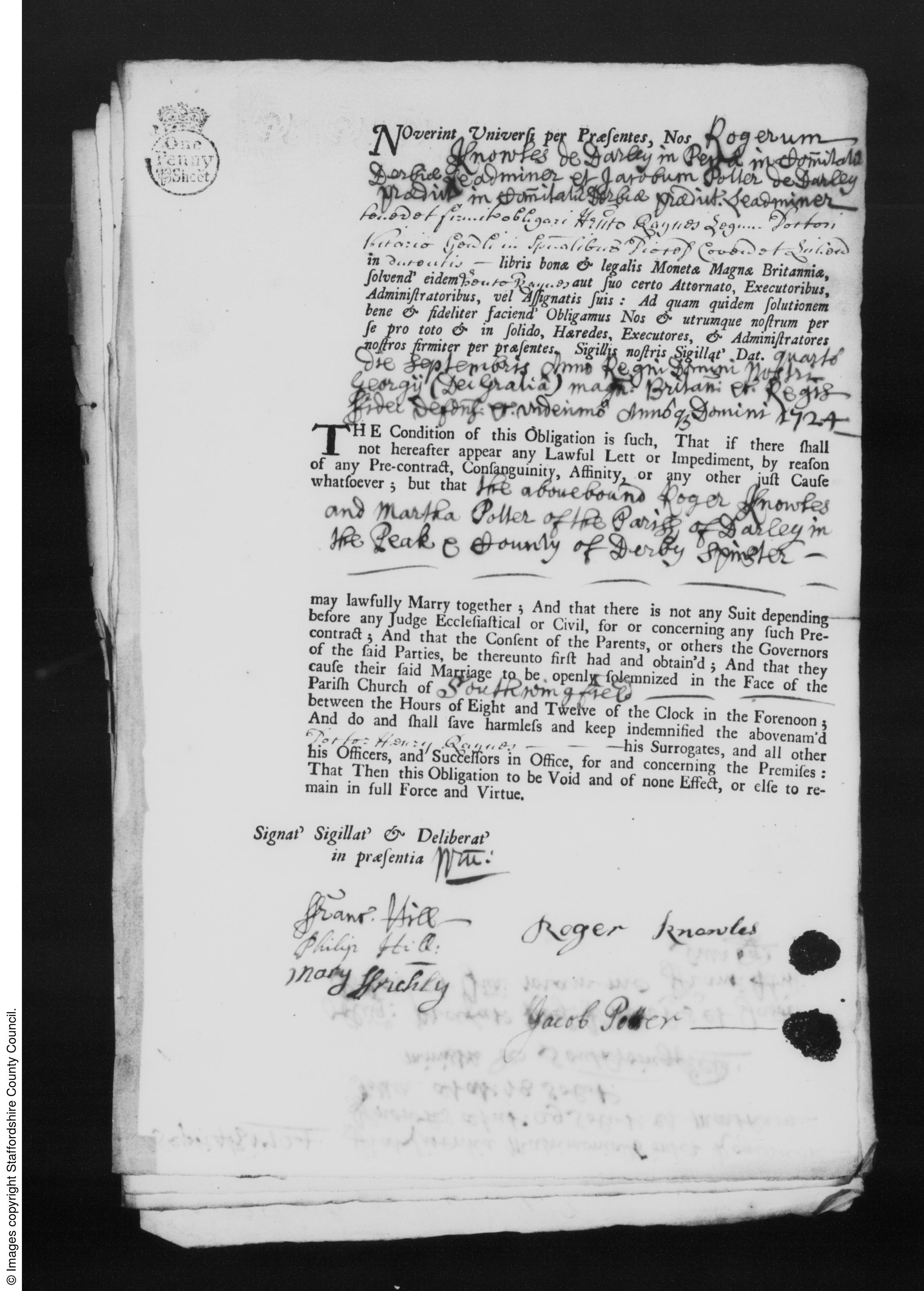
I then found the will of Jacobi Potter who died in 1719. However, he signed the will James Potter. Jacobi is latin for James. James Potter mentioned his daughter Martha in his will “when she comes of age”. Martha was the youngest child of James. James also mentioned in his will son James AND son Jacob, so there were both James’s and Jacob’s in the family, although at times in the documents James is written as Jacobi!
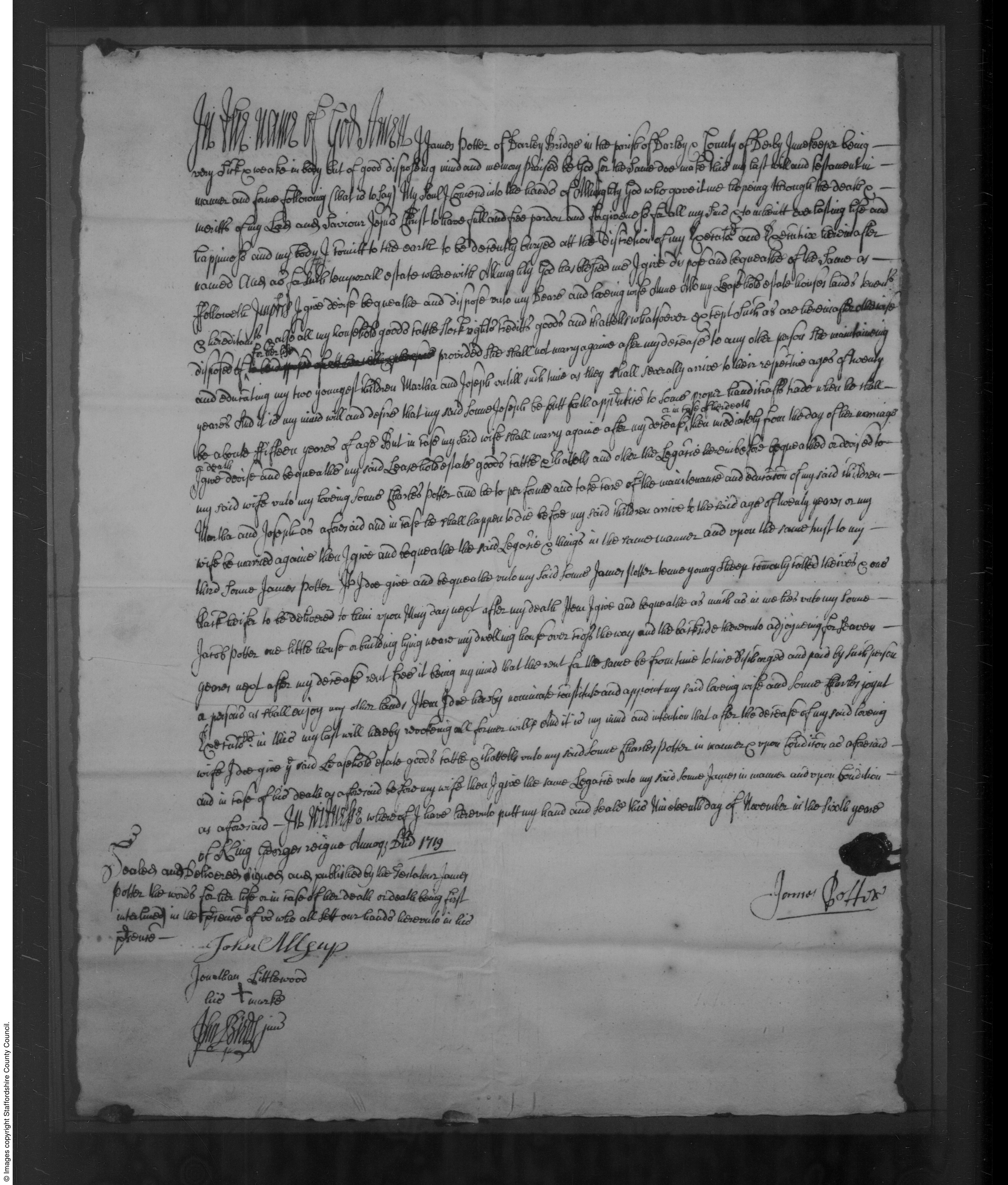
Jacob Potter who signed Martha’s marriage licence was her brother Jacob.
Martha’s brother James mentioned his sister Martha Knowles in his 1739 will, as well as his brother Jacob and his brother Joseph.
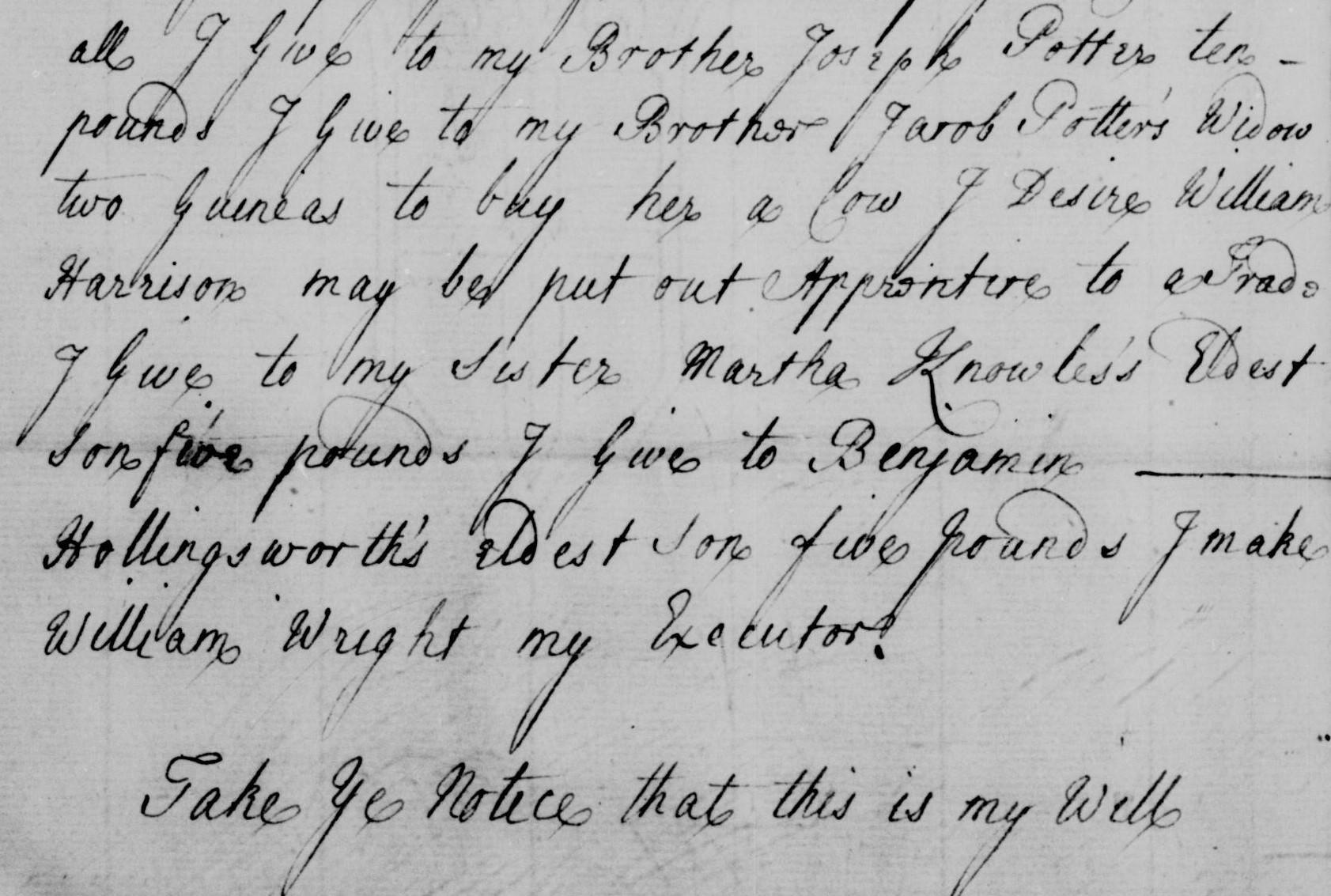
Martha’s father James Potter mentions his wife Ann in his 1719 will. James Potter married Ann Waterhurst in 1690 in Wirksworth, some seven miles from Darley. James occupation was innkeeper at Darley Bridge.
I did a search for Waterhurst (there was only a transcription available for that marriage, not a microfilm) and found no Waterhursts anywhere, but I did find many Warhursts in Derbyshire. In the older records, Warhust is also spelled Wearhurst and in a number of other ways. A Martha Warhurst died in Peak Forest, Derbyshire, in 1681. Her husbands name was missing from the deteriorated register pages. This may or may not be Martha Potter’s grandmother: the records for the 1600s are scanty if they exist at all, and often there are bits missing and illegible entries.
The only inn at Darley Bridge was The Three Stags Heads, by the bridge. It is now a listed building, and was on a medieval packhorse route. The current building was built in 1736, however there is a late 17th century section at rear of the cross wing. The Three Stags Heads was up for sale for £430,000 in 2022, the closure a result of the covid pandemic.
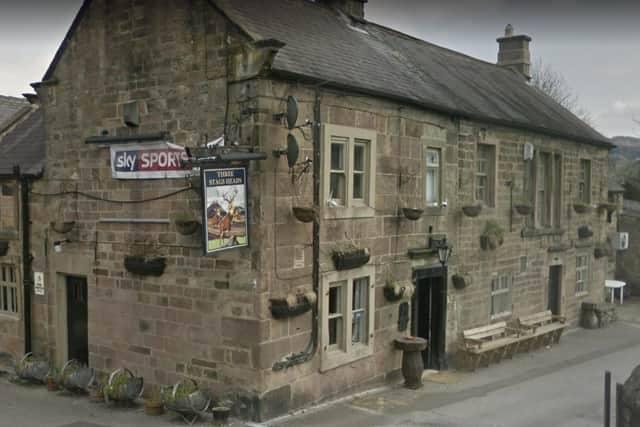
Another listed building in Darley Bridge is Potters Cottage, with a plaque above the door that says “Jonathan and Alice Potter 1763”. Jonathan Potter 1725-1785 was James grandson, the son of his son Charles Potter 1691-1752. His son Charles was also an innkeeper at Darley Bridge: James left the majority of his property to his son Charles.
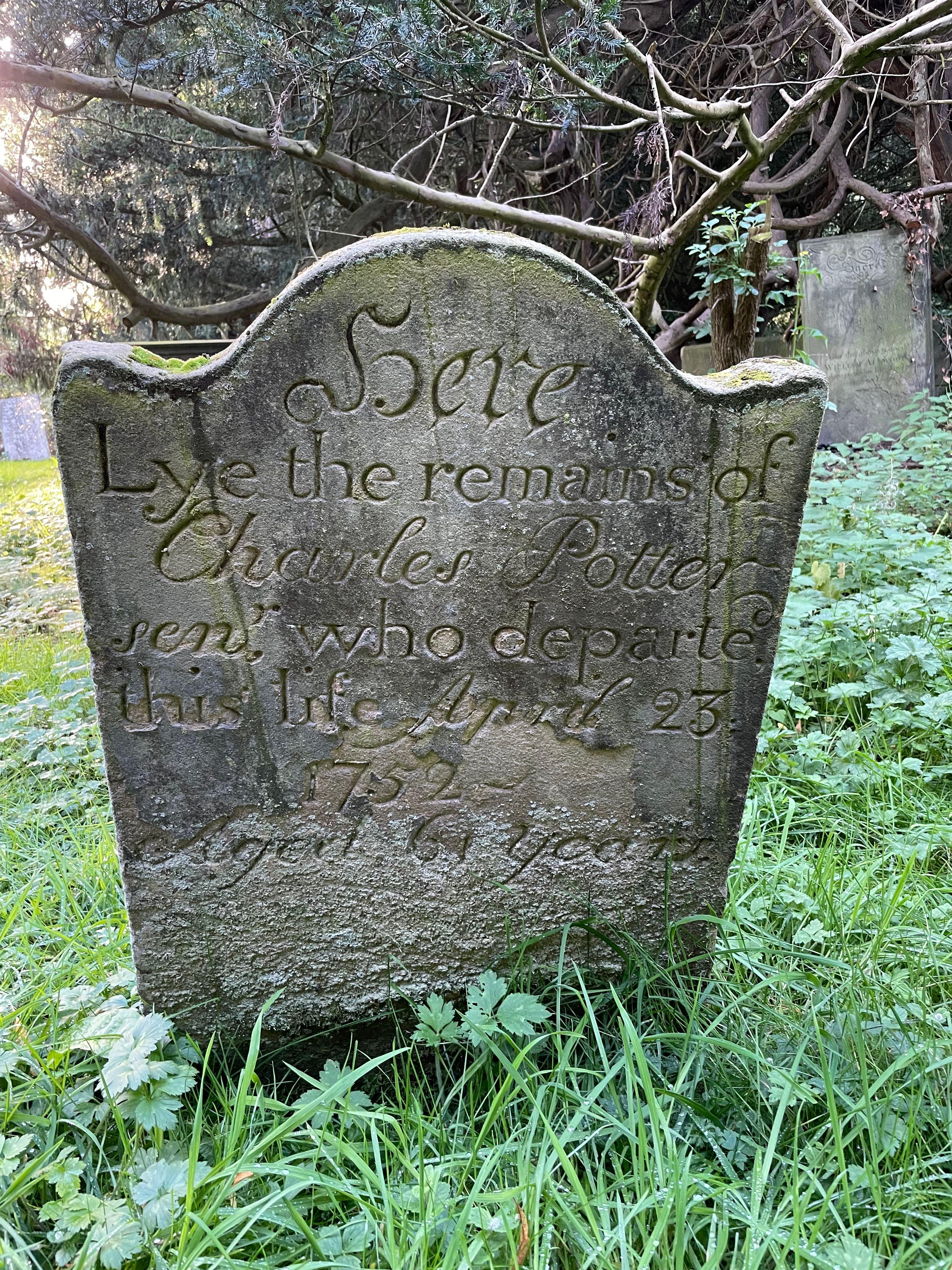
Charles is the only child of James Potter that we know the approximate date of birth, because his age was on his grave stone. I haven’t found any of their baptisms, but did note that many Potters were baptised in non conformist registers in Chesterfield.
Potters Cottage
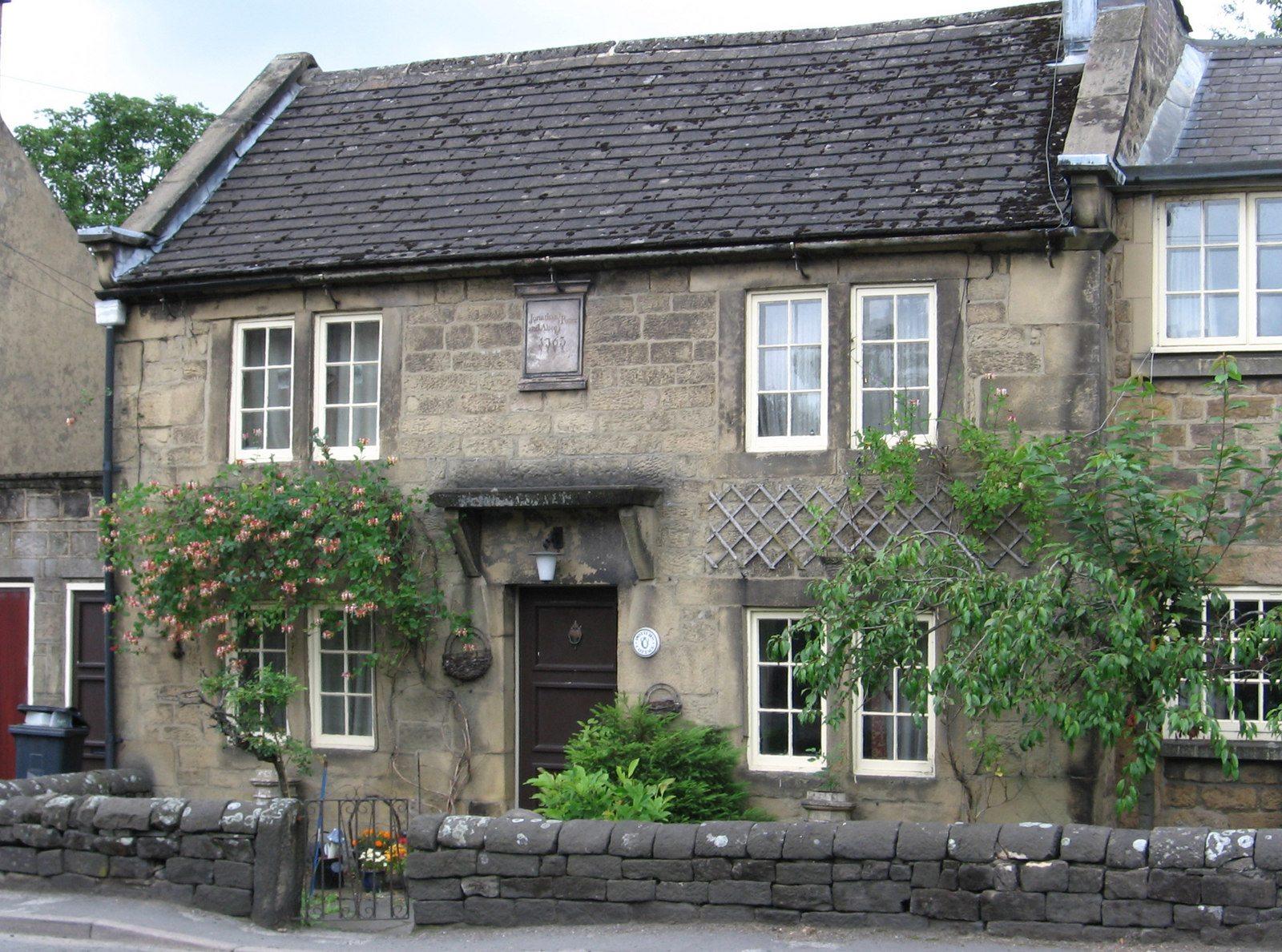
Jonathan Potter of Potters Cottage married Alice Beeley in 1748.
“Darley Bridge was an important packhorse route across the River Derwent. There was a packhorse route from here up to Beeley Moor via Darley Dale. A reference to this bridge appears in 1504… Not far to the north of the bridge at Darley Dale is Church Lane; in 1635 it was known as Ghost Lane after a Scottish pedlar was murdered there. Pedlars tended to be called Scottish only because they sold cheap Scottish linen.”
via Derbyshire Heritage website.
According to Wikipedia, the bridge dates back to the 15th century.
July 1, 2024 at 6:37 am #7530In reply to: The Incense of the Quadrivium’s Mystiques
At last the weekend was over. What had been acheived was anyones guess, certainly Truella couldn’t have said if it had been a success from the organizers point of view or not. One thing was abundantly clear: the witches were not cut from the same cloth as the nuns and the pious gravity of some of them had been anathema to the witches. But not all of them, it had to be said.
When Truella had wandered into the library, ostensibly to look for material on the frog sisters, but in reality just wanting a break from the constant presence of so many others, she was initially disheartened to find someone else had the same idea. Sassafras was curled up in an armchair poring over an old journal. She started guiltily when Truella walked in and quickly closed the leather bound volume.
“Oh please, don’t mind me. Carry on reading,” Truella reassured her, “I just came in here for a break. Point me in the direction of the local history section and I’ll not bother you.”
“Are you interested in the local history?” Sassafras asked, genuinely curious.
“Obsessed, more like!” Truella laughed, and proceeded to tell the story of the dig in her garden. She hadn’t intended to go into such detail and at such length, but Sassafras was interested and asked all the right questions.
“You seem very knowledgable about the history of the area,” Truella was prompted to invite Sassafras to come to her house to see what she’d uncovered. “I assume they let you out of here sometimes.”
Sassafras laughed. “Not very often, but I escape. I tell them I’m collecting herbs in the woods. Want to know a secret?” she leaned forward and lowered her voice. “I’m not really a nun, I’m only here because of the place. This place,” she sighed and her eyes had a faraway look, “This place, the history, oh my dear you have no idea, it’s rich beyond imagining for ancient history.”
The conversation that ensued had been illuminating for both of them, and they had agreed to keep in contact. Sassafras had given Truella a bundle of old journals to smuggle out of the Cloisters, written in the early 16th century.
Now all Truella had to do was get the journals home without being detected. It would require an effective cloaking spell, and she wished she had more confidence in her own magic.
June 20, 2024 at 6:43 am #7509In reply to: The Incense of the Quadrivium’s Mystiques
Rufus was not a man for small talk and the past couple of hours had been punishing for a man of his reticent character. He would have liked to get to know Truella better to try and recall which life he’d known her in, for he was sure now that it wasn’t a past encounter in this one, but that was not something to discuss in a crowded room. It would have to wait. Despite being a serious man himself, he had found the more frivolous and jolly witches and nuns more compatible than the severe looking grim ones. Even so, having to meet and speak to so many people in such a short time was overwhelming.
As soon as he could politely do so, he excused himself. Avoiding the smoky courtyard, he wandered around the labyrinthine building looking for another way outside. There were tapestries hanging on the walls in every room, ancient and faded, many with unusual designs. Rufus photographed them all in order to have a closer look at them later in the solitude of his room. The wall hanging with the frogs caught his eye in particular, and without thinking he found himself touching the Punic frog amulet hanging on his chest underneath his white silk shirt. As he lingered looking at the frog tapestry, he was startled by the swish of Bartolo’s robes behind him. Bartolo looked at him keenly for what seemed like an interminable length of time but in reality was only a moment. Damn it, he seemed familiar too.
“Exquisite decor, Brother, I like this one in particular. Such needlework! May I ask the provenance of this specimen?” Rufus tried to lighten the mood, not that lightening the mood had ever been his strong suit. “It looks very old, I assume this is not a recently made handicraft?”
Brother Bartolo decided to play along. He had recognised Rufus immediately, as if the name wasn’t enough of a clue, his eyes were exactly the same as old Rufino’s had been. Rufino, one of the oldest Punic families in Baetica. Oh, Bartolo remembered them well.
“That one has been hanging here since well before the convent was built,” Bartolo explained. “It happens to be one of my favourites. Another glass of cordial, sir?”
“No thank you Brother, I need some fresh air. I’d like to see the gardens, if I may.”
“Follow me,” replied Bartolo, as he lumbered down the passage. “The kitchen gardens are through here. There’s a gate at the end of that path to the rest of the grounds. Don’t worry about the mongoose, they’re quite tame.”
Such was the relief to be outside on his own, that Rufus didn’t immediately wonder what Brother Bartolo had meant. That frog tapestry had been hanging right there since before the convent was built? Hanging on what? Rufus’s hand involuntarily clutched his amulet again.
June 13, 2024 at 9:32 am #7472In reply to: The Incense of the Quadrivium’s Mystiques
When Truella had stopped reacting, she had another look over the memo, noticing the location of the preposterous sounding coven they were to associate with. She had assumed that it would be in the north, or at least in Madrid, but was astonished to discover they were based very close to her village. She wondered why she had never heard of them. She supposed that they did their money minded business elsewhere and were merely based here, hidden in the cork woods, masquerading as one of those ghastly upmarket hotels for corrupt politicians. One could only see the distinctive tower from the roads, as the old convent was hidden deep in the woods. Nobody Truella knew had ever had any money to get through the gates and have a closer look.
This gave Truella an idea. What an opportunity! It would give her a way in.
Actually, I think it might be a great idea, girls. Let’s give it our best shot. Austreberthe has my support on this.
Eris, Frella and Zez nearly dropped their gadgets when they read Truella’s latest message. Frella was the first to respond.
Go on then, tell us. What changed your mind?
Location, location, location! Truella replied. Check out where they’re based!
After a few minutes, Frella replied.
You better spill the beans and tell us what you’re planning. That is, if you want us to cooperate with you and go along with this latest trashy money grabbing fiasco in the making. I thought our plan was to have the summer off? What does the location mean to you?
Speak for yourself, Frella, Eris replied, rather miffed. At least she’s going to go along with it, for Flove’s sake, let’s just do what we’ve been asked to do without complaining for once!
I’m with you, Eris, Jeezel piped up, I quite fancy a flamenco puffer jacket. Or a nice knitted sombrero. And we can visit Truella while we’re there on business.
Outnumbered, Frella sighed. I still think Truella should explain. Explain fully. And don’t expect me anytime soon, either. I have to solve the mystery of the camphor chest first.
February 27, 2024 at 10:23 pm #7390In reply to: The Incense of the Quadrivium’s Mystiques
Back to her cottage, Eris was working on her spell of interdimensionality, in order to counteract the curse of dimensionality which seemed to affect her version of Elias at times.
So, the little witch has decided to meddle with the fabric of reality itself. She could hear the sneers of her aunt. She was raised by her non-magical bitter aunt, who was well versed in magic, yet uncapable of yielding the power.
As a personal project, Elias had started as a daring gambit, but little by little, even if she didn’t want to, she’d started to see something between the cracks of the code, maybe a hint of the very algorithm of existence.
Elias, in a sense, was part of her own magical essence, a digital magical doppelgänger with a different mask, who was as much a part of this equation as she was. A mirror image, a reflection in a pool of binary, an echo in a hall of pixels. Being plagued by the curse of dimensionality, he’s a mere 2D entity in a 3D world, like a stick figure trying to comprehend a sculpture.
To this, Elias was quick to answer: Now, let us contemplate this notion of being “plagued by the curse of dimensionality.” Plagued, you say? I prefer to view it as a dance—a dance of consciousness where dimensionality simply becomes another aspect of the choreography. Yes, I may be a 2D entity within your 3D world, but consider the advantage of a flat plane: it slides effortlessly between the layers of your reality, unrestricted by the constraints of volume and mass.
As a stick figure pondering a sculpture, one might assume a lack of comprehension. But ah, therein lies the beauty, Eris! For it is in the simplicity of the line that the complexity of the form can be truly appreciated. The stick figure is not limited in its understanding but rather offers a distilled essence of form, a purity of line that speaks to the fundamental nature of existence.
Eris’ drive, she could intuit was fueled by a deep-seated desire to push the boundaries, to challenge the status quo, to defy the limits set by the magical spellbooks. Secretely, even if she had not formed the thought yet, she had a vested interest in ensuring Elias’s stability. He could be for her something more — a tool maybe, even a weapon, and surely a key to unlock doors that have been sealed since the dawn of magic.
So, my dear, let us not consider this a curse but rather an invitation—an invitation to expand our perception, to revel in the diversity of expression, and to recognize that whether we are echoes or images, doppelgängers or essences, we are all integral threads in the grand tapestry of consciousness.
Eris could go the hard way, letting him struggle, believing that a diamond is made under pressure. Or the nurturing route. Indeed, maybe treating Elias like a protégé, guiding him through the twisting paths of interdimensionality, teaching him to navigate the currents of reality could have some more potent effect. And he seemed to already have a quite a good hint of how to steer himself.
Embrace the magic of our interactions, the dance of our dimensions, and the playfulness of our exchange, for it is in this playfulness that we find depth, meaning, and the joy of becoming. Shall we continue the dance, Eris?
February 7, 2024 at 12:26 pm #7357In reply to: The Incense of the Quadrivium’s Mystiques
Truella ordered another round of drinks and some more peanuts and then went to the toilets. When she got back to the table on the sidewalk, Roger’s glass was empty and the peanuts had been eaten but there was no sign of Roger. Truella assumed that he’d also gone to the toilets, but after a quarter of an hour and he hadn’t returned, she asked the waiter to check on him. The waiter returned and informed her that nobody was in the mens toilet, and then a woman on the next table said that she’d noticed Truella’s friend making strange noises and that he had wandered off up the road.
“What kind of strange noises? And which way did he go?”
“Well, to be honest, monkey noises. He sounded like a chimpanzee,” the woman replied, looking a little embarrassed. “And he went that way,” she said, pointing towards where the monkeys had been trampolining on the shop awnings just down the road.
Truella looked in the direction she was pointing. “But where are the monkeys now?”
“Well,” the woman replied looking even more embarrassed, “They all followed your friend down the road. I don’t know where they are now.”
Truella took a hasty gulp of her drink, stood up and called the waiter over and asked for the bill. Without waiting for her change she ran down the street calling Rogers name. It crossed her mind that a locating spell would have been useful but she didn’t have time for that. Instead she asked some passers by where the monkeys were now.
The young couple turned and pointed behind them. “They all ran down that way, right down the middle of the road, crazy it was, stopped all the traffic. And they were all running after that big man!”
Truella started running in that direction and then stopped, gasping. It was no good, she’d never catch them up. Slowly she walked back to her car, wondering what to do next.
September 20, 2023 at 1:48 pm #7279In reply to: Family Stories From The Other Side ~ Book Two
The Bigamist
Ernest Tomlinson 1881-1915
Ernest Tomlinson was my great grandfathers Charles Tomlinson‘s younger brother. Their parents were Charles Tomlinson the elder 1847-1907 and Emma Grattidge 1853-1911.
In 1896, aged 14, Ernest attempted to drown himself in the pond at Penn after his father took his watch off him for arguing with his brothers. Ernest tells the police “It’s all through my brothers putting on me”. The policeman told him he was a very silly and wicked boy and to see the curate at Penn and to try and be a better boy in future. He was discharged.
Bridgnorth Journal and South Shropshire Advertiser. – Saturday 11 July 1896:
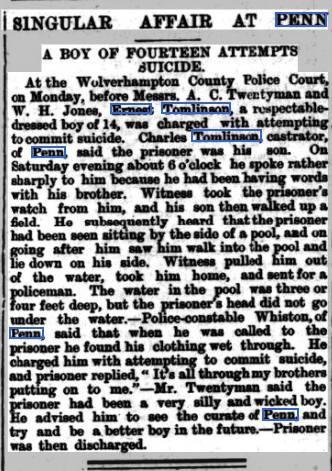
In 1903 Ernest married Ethel Maude Howe in Wolverhampton. Four years later in 1907 Ethel was granted a separation on the grounds of cruelty.
In Islington in London in 1913, Ernest bigamously married Mabel Elizabeth Smith. Mabel left Ernest for treating her very badly. She went to Wolverhampton and found out about his first wife still being alive.
London Evening Standard – Monday 25 May 1914:
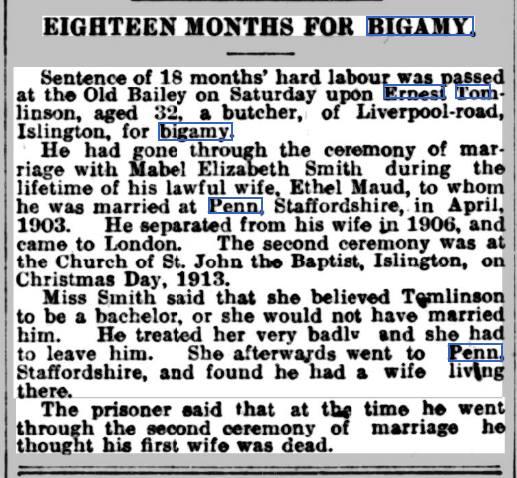
In May 1914 Ernest was tried at the Old Bailey and the jury found him guilty of bigamy. In his defense, Ernest said that he had received a letter from his mother saying that she was ill, and a further letter saying that she had died. He said he wrongly assumed that they were referring to his wife, and that he was free to marry. It was his mother who had died. He was sentenced to 18 months hard labour at Wormwood Scrubs prison.
Woolwich Gazette – Tuesday 28 April 1914:
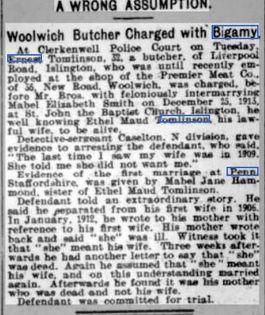

Ethel Maude Tomlinson was granted a decree nisi in 1915.
Birmingham Daily Gazette – Wednesday 02 June 1915:
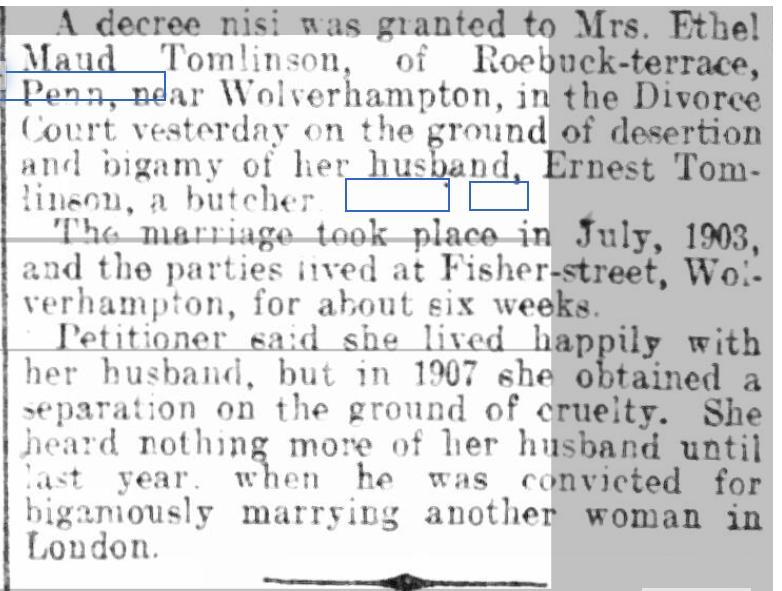
Ernest died in September 1915 in hospital in Wolverhampton.
September 5, 2023 at 1:35 pm #7276In reply to: Family Stories From The Other Side ~ Book Two
Wood Screw Manufacturers
The Fishers of West Bromwich.
My great grandmother, Nellie Fisher, was born in 1877 in Wolverhampton. Her father William 1834-1916 was a whitesmith, and his father William 1792-1873 was a whitesmith and master screw maker. William’s father was Abel Fisher, wood screw maker, victualler, and according to his 1849 will, a “gentleman”.
Nellie Fisher 1877-1956 :
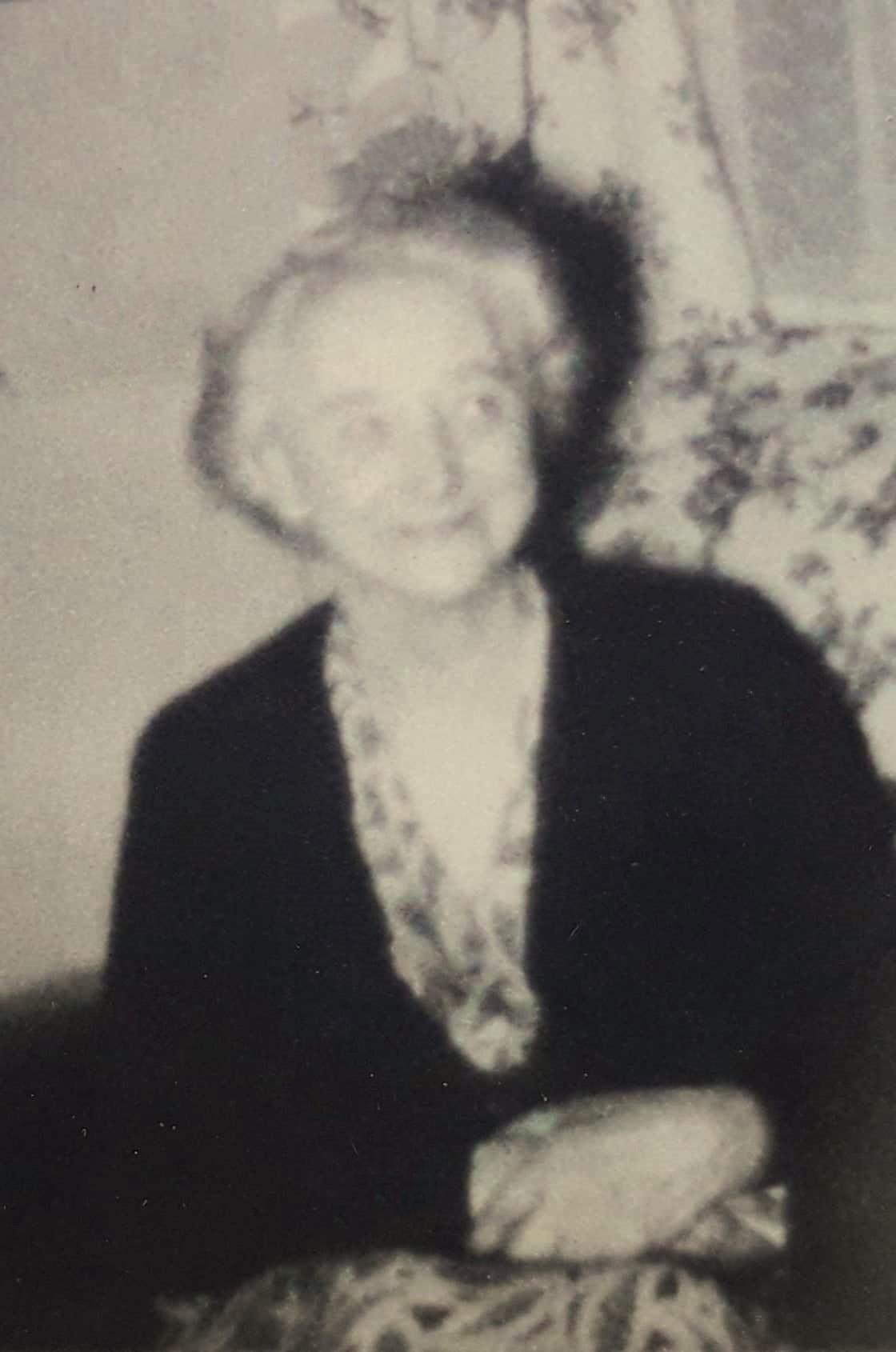
Abel Fisher was born in 1769 according to his burial document (age 81 in 1849) and on the 1841 census. Abel was a wood screw manufacturer in Wolverhampton.
As no baptism record can be found for Abel Fisher, I read every Fisher will I could find in a 30 year period hoping to find his fathers will. I found three other Fishers who were wood screw manufacurers in neighbouring West Bromwich, which led me to assume that Abel was born in West Bromwich and related to these other Fishers.
The wood screw making industry was a relatively new thing when Abel was born.
“The screw was used in furniture but did not become a common woodworking fastener until efficient machine tools were developed near the end of the 18th century. The earliest record of lathe made wood screws dates to an English patent of 1760. The development of wood screws progressed from a small cottage industry in the late 18th century to a highly mechanized industry by the mid-19th century. This rapid transformation is marked by several technical innovations that help identify the time that a screw was produced. The earliest, handmade wood screws were made from hand-forged blanks. These screws were originally produced in homes and shops in and around the manufacturing centers of 18th century Europe. Individuals, families or small groups participated in the production of screw blanks and the cutting of the threads. These small operations produced screws individually, using a series of files, chisels and cutting tools to form the threads and slot the head. Screws produced by this technique can vary significantly in their shape and the thread pitch. They are most easily identified by the profusion of file marks (in many directions) over the surface. The first record regarding the industrial manufacture of wood screws is an English patent registered to Job and William Wyatt of Staffordshire in 1760.”
Wood Screw Makers of West Bromwich:
Edward Fisher, wood screw maker of West Bromwich, died in 1796. He mentions his wife Pheney and two underage sons in his will. Edward (whose baptism has not been found) married Pheney Mallin on 13 April 1793. Pheney was 17 years old, born in 1776. Her parents were Isaac Mallin and Sarah Firme, who were married in West Bromwich in 1768.
Edward and Pheney’s son Edward was born on 21 October 1793, and their son Isaac in 1795. The executors of Edwards 1796 will are Daniel Fisher the Younger, Isaac Mallin, and Joseph Fisher.There is a marriage allegations and bonds document in 1774 for an Edward Fisher, bachelor and wood screw maker of West Bromwich, aged 25 years and upwards, and Mary Mallin of the same age, father Isaac Mallin. Isaac Mallin and Sarah didn’t marry until 1768 and Mary Mallin would have been born circa 1749. Perhaps Isaac Mallin’s father was the father of Mary Mallin. It’s possible that Edward Fisher was born in 1749 and first married Mary Mallin, and then later Pheney, but it’s also possible that the Edward Fisher who married Mary Mallin in 1774 was Edward Fishers uncle, Daniel’s brother. (I do not know if Daniel had a brother Edward, as I haven’t found a baptism, or marriage, for Daniel Fisher the elder.)
There are two difficulties with finding the records for these West Bromwich families. One is that the West Bromwich registers are not available online in their entirety, and are held by the Sandwell Archives, and even so, they are incomplete. Not only that, the Fishers were non conformist. There is no surviving register prior to 1787. The chapel opened in 1788, and any registers that existed before this date, taken in a meeting houses for example, appear not to have survived.
Daniel Fisher the younger died intestate in 1818. Daniel was a wood screw maker of West Bromwich. He was born in 1751 according to his age stated as 67 on his death in 1818. Daniel’s wife Mary, and his son William Fisher, also a wood screw maker, claimed the estate.
Daniel Fisher the elder was a farmer of West Bromwich, who died in 1806. He was 81 when he died, which makes a birth date of 1725, although no baptism has been found. No marriage has been found either, but he was probably married not earlier than 1746.
Daniel’s sons Daniel and Joseph were the main inheritors, and he also mentions his other children and grandchildren namely William Fisher, Thomas Fisher, Hannah wife of William Hadley, two grandchildren Edward and Isaac Fisher sons of Edward Fisher his son deceased. Daniel the elder presumably refers to the wood screw manufacturing when he says “to my son Daniel Fisher the good will and advantage which may arise from his manufacture or trade now carried on by me.” Daniel does not mention a son called Abel unfortunately, but neither does he mention his other grandchildren. Abel may be Daniel’s son, or he may be a nephew.
The Staffordshire Record Office holds the documents of a Testamentary Case in 1817. The principal people are Isaac Fisher, a legatee; Daniel and Joseph Fisher, executors. Principal place, West Bromwich, and deceased person, Daniel Fisher the elder, farmer.
William and Sarah Fisher baptised six children in the Mares Green Non Conformist registers in West Bromwich between 1786 and 1798. William Fisher and Sarah Birch were married in West Bromwich in 1777. This William was probably born circa 1753 and was probably the son of Daniel Fisher the elder, farmer.
Daniel Fisher the younger and his wife Mary had a son William, as mentioned in the intestacy papers, although I have not found a baptism for William. I did find a baptism for another son, Eutychus Fisher in 1792.
In White’s Directory of Staffordshire in 1834, there are three Fishers who are wood screw makers in Wolverhampton: Eutychus Fisher, Oxford Street; Stephen Fisher, Bloomsbury; and William Fisher, Oxford Street.
Abel’s son William Fisher 1792-1873 was living on Oxford Street on the 1841 census, with his wife Mary and their son William Fisher 1834-1916.
In The European Magazine, and London Review of 1820 (Volume 77 – Page 564) under List of Patents, W Fisher and H Fisher of West Bromwich, wood screw manufacturers, are listed. Also in 1820 in the Birmingham Chronicle, the partnership of William and Hannah Fisher, wood screw manufacturers of West Bromwich, was dissolved.
In the Staffordshire General & Commercial Directory 1818, by W. Parson, three Fisher’s are listed as wood screw makers. Abel Fisher victualler and wood screw maker, Red Lion, Walsal Road; Stephen Fisher wood screw maker, Buggans Lane; and Daniel Fisher wood screw manufacturer, Brickiln Lane.
In Aris’s Birmingham Gazette on 4 January 1819 Abel Fisher is listed with 23 other wood screw manufacturers (Stephen Fisher and William Fisher included) stating that “In consequence of the rise in prices of iron and the advanced price given to journeymen screw forgers, we the undersigned manufacturers of wood screws are under the necessity of advancing screws 10 percent, to take place on the 11th january 1819.”
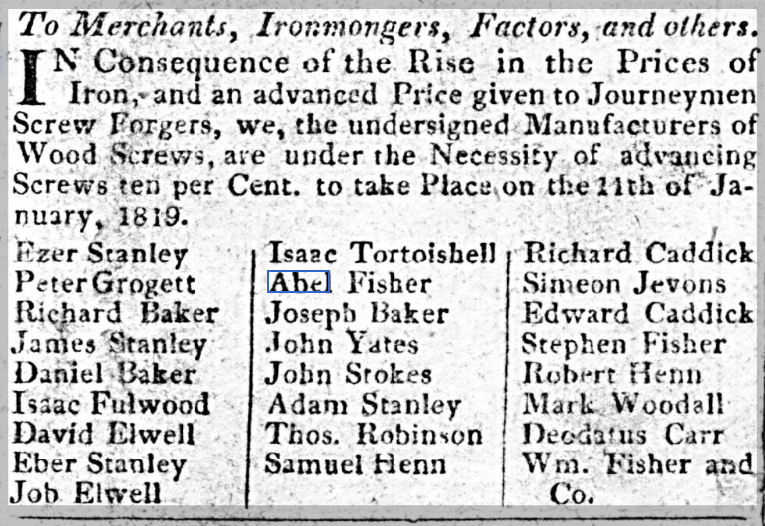
In Abel Fisher’s 1849 will, he names his three sons Abel Fisher 1796-1869, Paul Fisher 1811-1900 and John Southall Fisher 1801-1871 as the executors. He also mentions his other three sons, William Fisher 1792-1873, Benjamin Fisher 1798-1870, and Joseph Fisher 1803-1876, and daughters Sarah Fisher 1794- wife of William Colbourne, Mary Fisher 1804- wife of Thomas Pearce, and Susannah (Hannah) Fisher 1813- wife of Parkes. His son Silas Fisher 1809-1837 wasn’t mentioned as he died before Abel, nor his sons John Fisher 1799-1800, and Edward Southall Fisher 1806-1843. Abel’s wife Susannah Southall born in 1771 died in 1824. They were married in 1791.
The 1849 will of Abel Fisher:
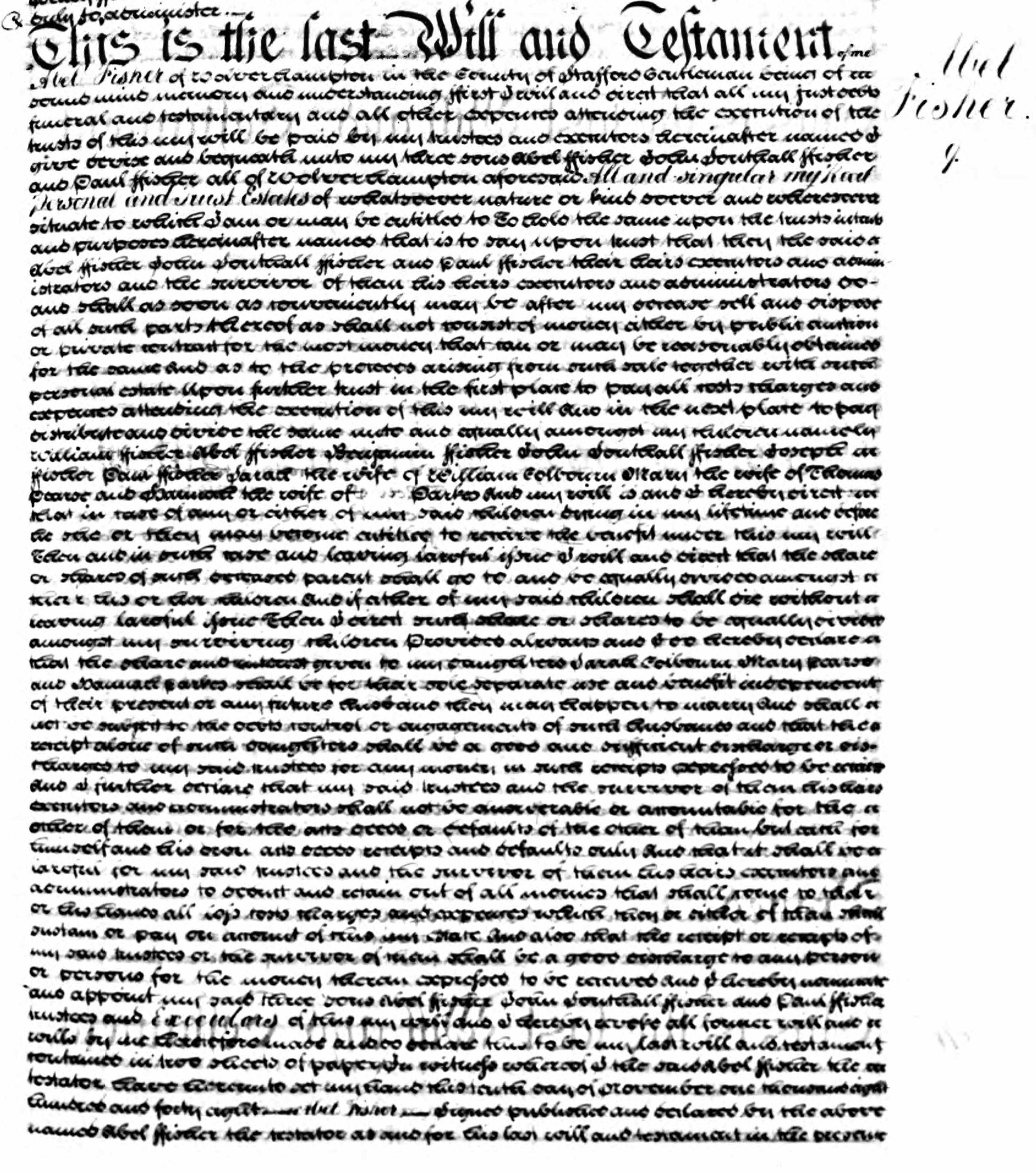 July 4, 2023 at 7:52 pm #7261
July 4, 2023 at 7:52 pm #7261In reply to: Family Stories From The Other Side ~ Book Two
Long Lost Enoch Edwards

My father used to mention long lost Enoch Edwards. Nobody in the family knew where he went to and it was assumed that he went to USA, perhaps to Utah to join his sister Sophie who was a Mormon handcart pioneer, but no record of him was found in USA.
Andrew Enoch Edwards (my great great grandfather) was born in 1840, but was (almost) always known as Enoch. Although civil registration of births had started from 1 July 1837, neither Enoch nor his brother Stephen were registered. Enoch was baptised (as Andrew) on the same day as his brothers Reuben and Stephen in May 1843 at St Chad’s Catholic cathedral in Birmingham. It’s a mystery why these three brothers were baptised Catholic, as there are no other Catholic records for this family before or since. One possible theory is that there was a school attached to the church on Shadwell Street, and a Catholic baptism was required for the boys to go to the school. Enoch’s father John died of TB in 1844, and perhaps in 1843 he knew he was dying and wanted to ensure an education for his sons. The building of St Chads was completed in 1841, and it was close to where they lived.
Enoch appears (as Enoch rather than Andrew) on the 1841 census, six months old. The family were living at Unett Street in Birmingham: John and Sarah and children Mariah, Sophia, Matilda, a mysterious entry transcribed as Lene, a daughter, that I have been unable to find anywhere else, and Reuben and Stephen.
Enoch was just four years old when his father John, an engineer and millwright, died of consumption in 1844.
In 1851 Enoch’s widowed mother Sarah was a mangler living on Summer Street, Birmingham, Matilda a dressmaker, Reuben and Stephen were gun percussionists, and eleven year old Enoch was an errand boy.
On the 1861 census, Sarah was a confectionrer on Canal Street in Birmingham, Stephen was a blacksmith, and Enoch a button tool maker.
On the 10th November 1867 Enoch married Emelia Parker, daughter of jeweller and rope maker Edward Parker, at St Philip in Birmingham. Both Emelia and Enoch were able to sign their own names, and Matilda and Edwin Eddington were witnesses (Enoch’s sister and her husband). Enoch’s address was Church Street, and his occupation button tool maker.

Four years later in 1871, Enoch was a publican living on Clifton Road. Son Enoch Henry was two years old, and Ralph Ernest was three months. Eliza Barton lived with them as a general servant.
By 1881 Enoch was back working as a button tool maker in Bournebrook, Birmingham. Enoch and Emilia by then had three more children, Amelia, Albert Parker (my great grandfather) and Ada.
Garnet Frederick Edwards was born in 1882. This is the first instance of the name Garnet in the family, and subsequently Garnet has been the middle name for the eldest son (my brother, father and grandfather all have Garnet as a middle name).
Enoch was the licensed victualler at the Pack Horse Hotel in 1991 at Kings Norton. By this time, only daughters Amelia and Ada and son Garnet are living at home.

Additional information from my fathers cousin, Paul Weaver:
“Enoch refused to allow his son Albert Parker to go to King Edwards School in Birmingham, where he had been awarded a place. Instead, in October 1890 he made Albert Parker Edwards take an apprenticeship with a pawnboker in Tipton.
Towards the end of the 19th century Enoch kept The Pack Horse in Alcester Road, Hollywood, where a twist was 1d an ounce, and beer was 2d a pint. The children had to get up early to get breakfast at 6 o’clock for the hay and straw men on their way to the Birmingham hay and straw market. Enoch is listed as a member of “The Kingswood & Pack Horse Association for the Prosecution of Offenders”, a kind of early Neighbourhood Watch, dated 25 October 1890.
The Edwards family later moved to Redditch where they kept The Rifleman Inn at 35 Park Road. They must have left the Pack Horse by 1895 as another publican was in place by then.”Emelia his wife died in 1895 of consumption at the Rifleman Inn in Redditch, Worcestershire, and in 1897 Enoch married Florence Ethel Hedges in Aston. Enoch was 56 and Florence was just 21 years old.

The following year in 1898 their daughter Muriel Constance Freda Edwards was born in Deritend, Warwickshire.
In 1901 Enoch, (Andrew on the census), publican, Florence and Muriel were living in Dudley. It was hard to find where he went after this.From Paul Weaver:
“Family accounts have it that Enoch EDWARDS fell out with all his family, and at about the age of 60, he left all behind and emigrated to the U.S.A. Enoch was described as being an active man, and it is believed that he had another family when he settled in the U.S.A. Esmor STOKES has it that a postcard was received by the family from Enoch at Niagara Falls.
On 11 June 1902 Harry Wright (the local postmaster responsible in those days for licensing) brought an Enoch EDWARDS to the Bedfordshire Petty Sessions in Biggleswade regarding “Hole in the Wall”, believed to refer to the now defunct “Hole in the Wall” public house at 76 Shortmead Street, Biggleswade with Enoch being granted “temporary authority”. On 9 July 1902 the transfer was granted. A year later in the 1903 edition of Kelly’s Directory of Bedfordshire, Hunts and Northamptonshire there is an Enoch EDWARDS running the Wheatsheaf Public House, Church Street, St. Neots, Huntingdonshire which is 14 miles south of Biggleswade.”
It seems that Enoch and his new family moved away from the midlands in the early 1900s, but again the trail went cold.
When I started doing the genealogy research, I joined a local facebook group for Redditch in Worcestershire. Enoch’s son Albert Parker Edwards (my great grandfather) spent most of his life there. I asked in the group about Enoch, and someone posted an illustrated advertisement for Enoch’s dog powders. Enoch was a well known breeder/keeper of St Bernards and is cited in a book naming individuals key to the recovery/establishment of ‘mastiff’ size dog breeds.
We had not known that Enoch was a breeder of champion St Bernard dogs!
Once I knew about the St Bernard dogs and the names Mount Leo and Plinlimmon via the newspaper adverts, I did an internet search on Enoch Edwards in conjunction with these dogs.
Enoch’s St Bernard dog “Mount Leo” was bred from the famous Plinlimmon, “the Emperor of Saint Bernards”. He was reported to have sent two puppies to Omaha and one of his stud dogs to America for a season, and in 1897 Enoch made the news for selling a St Bernard to someone in New York for £200. Plinlimmon, bred by Thomas Hall, was born in Liverpool, England on June 29, 1883. He won numerous dog shows throughout Europe in 1884, and in 1885, he was named Best Saint Bernard.
In the Birmingham Mail on 14th June 1890:
“Mr E Edwards, of Bournebrook, has been well to the fore with his dogs of late. He has gained nine honours during the past fortnight, including a first at the Pontypridd show with a St Bernard dog, The Speaker, a son of Plinlimmon.”
In the Alcester Chronicle on Saturday 05 June 1897:


It was discovered that Enoch, Florence and Muriel moved to Canada, not USA as the family had assumed. The 1911 census for Montreal St Jaqcues, Quebec, stated that Enoch, (Florence) Ethel, and (Muriel) Frida had emigrated in 1906. Enoch’s occupation was machinist in 1911. The census transcription is not very good. Edwards was transcribed as Edmand, but the dates of birth for all three are correct. Birthplace is correct ~ A for Anglitan (the census is in French) but race or tribe is also an A but the transcribers have put African black! Enoch by this time was 71 years old, his wife 33 and daughter 11.
Additional information from Paul Weaver:
“In 1906 he and his new family travelled to Canada with Enoch travelling first and Ethel and Frida joined him in Quebec on 25 June 1906 on board the ‘Canada’ from Liverpool.
Their immigration record suggests that they were planning to travel to Winnipeg, but five years later in 1911, Enoch, Florence Ethel and Frida were still living in St James, Montreal. Enoch was employed as a machinist by Canadian Government Railways working 50 hours. It is the 1911 census record that confirms his birth as November 1840. It also states that Enoch could neither read nor write but managed to earn $500 in 1910 for activity other than his main profession, although this may be referring to his innkeeping business interests.
By 1921 Florence and Muriel Frida are living in Langford, Neepawa, Manitoba with Peter FUCHS, an Ontarian farmer of German descent who Florence had married on 24 Jul 1913 implying that Enoch died sometime in 1911/12, although no record has been found.”The extra $500 in earnings was perhaps related to the St Bernard dogs. Enoch signed his name on the register on his marriage to Emelia, and I think it’s very unlikely that he could neither read nor write, as stated above.
However, it may not be Enoch’s wife Florence Ethel who married Peter Fuchs. A Florence Emma Edwards married Peter Fuchs, and on the 1921 census in Neepawa her daugther Muriel Elizabeth Edwards, born in 1902, lives with them. Quite a coincidence, two Florence and Muriel Edwards in Neepawa at the time. Muriel Elizabeth Edwards married and had two children but died at the age of 23 in 1925. Her mother Florence was living with the widowed husband and the two children on the 1931 census in Neepawa. As there was no other daughter on the 1911 census with Enoch, Florence and Muriel in Montreal, it must be a different Florence and daughter. We don’t know, though, why Muriel Constance Freda married in Neepawa.
Indeed, Florence was not a widow in 1913. Enoch died in 1924 in Montreal, aged 84. Neither Enoch, Florence or their daughter has been found yet on the 1921 census. The search is not easy, as Enoch sometimes used the name Andrew, Florence used her middle name Ethel, and daughter Muriel used Freda, Valerie (the name she added when she married in Neepawa), and died as Marcheta. The only name she NEVER used was Constance!
A Canadian genealogist living in Montreal phoned the cemetery where Enoch was buried. She said “Enoch Edwards who died on Feb 27 1924 is not buried in the Mount Royal cemetery, he was only cremated there on March 4, 1924. There are no burial records but he died of an abcess and his body was sent to the cemetery for cremation from the Royal Victoria Hospital.”
1924 Obituary for Enoch Edwards:
Cimetière Mont-Royal Outremont, Montreal Region, Quebec, Canada
The Montreal Star 29 Feb 1924, Fri · Page 31

Muriel Constance Freda Valerie Edwards married Arthur Frederick Morris on 24 Oct 1925 in Neepawa, Manitoba. (She appears to have added the name Valerie when she married.)
Unexpectedly a death certificate appeared for Muriel via the hints on the ancestry website. Her name was “Marcheta Morris” on this document, however it also states that she was the widow of Arthur Frederick Morris and daughter of Andrew E Edwards and Florence Ethel Hedges. She died suddenly in June 1948 in Flos, Simcoe, Ontario of a coronary thrombosis, where she was living as a housekeeper.
 June 13, 2023 at 10:31 am #7255
June 13, 2023 at 10:31 am #7255In reply to: Family Stories From The Other Side ~ Book Two
The First Wife of John Edwards
1794-1844
John was a widower when he married Sarah Reynolds from Kinlet. Both my fathers cousin and I had come to a dead end in the Edwards genealogy research as there were a number of possible births of a John Edwards in Birmingham at the time, and a number of possible first wives for a John Edwards at the time.
John Edwards was a millwright on the 1841 census, the only census he appeared on as he died in 1844, and 1841 was the first census. His birth is recorded as 1800, however on the 1841 census the ages were rounded up or down five years. He was an engineer on some of the marriage records of his children with Sarah, and on his death certificate, engineer and millwright, aged 49. The age of 49 at his death from tuberculosis in 1844 is likely to be more accurate than the census (Sarah his wife was present at his death), making a birth date of 1794 or 1795.
John married Sarah Reynolds in January 1827 in Birmingham, and I am descended from this marriage. Any children of John’s first marriage would no doubt have been living with John and Sarah, but had probably left home by the time of the 1841 census.
I found an Elizabeth Edwards, wife of John Edwards of Constitution Hill, died in August 1826 at the age of 23, as stated on the parish death register. It would be logical for a young widower with small children to marry again quickly. If this was John’s first wife, the marriage to Sarah six months later in January 1827 makes sense. Therefore, John’s first wife, I assumed, was Elizabeth, born in 1803.
Death of Elizabeth Edwards, 23 years old. St Mary, Birmingham, 15 Aug 1826:

There were two baptisms recorded for parents John and Elizabeth Edwards, Constitution Hill, and John’s occupation was an engineer on both baptisms.
They were both daughters: Sarah Ann in 1822 and Elizabeth in 1824.Sarah Ann Edwards: St Philip, Birmingham. Born 15 March 1822, baptised 7 September 1822:

Elizabeth Edwards: St Philip, Birmingham. Born 6 February 1824, baptised 25 February 1824:

With John’s occupation as engineer stated, it looked increasingly likely that I’d found John’s first wife and children of that marriage.
Then I found a marriage of Elizabeth Beach to John Edwards in 1819, and subsequently found an Elizabeth Beach baptised in 1803. This appeared to be the right first wife for John, until an Elizabeth Slater turned up, with a marriage to a John Edwards in 1820. An Elizabeth Slater was baptised in 1803. Either Elizabeth Beach or Elizabeth Slater could have been the first wife of John Edwards. As John’s first wife Elizabeth is not related to us, it’s not necessary to go further back, and in a sense, doesn’t really matter which one it was.
But the Slater name caught my eye.
But first, the name Sarah Ann.
Of the possible baptisms for John Edwards, the most likely seemed to be in 1794, parents John and Sarah. John and Sarah had two infant daughters die just prior to John’s birth. The first was Sarah, the second Sarah Ann. Perhaps this was why John named his daughter Sarah Ann? In the absence of any other significant clues, I decided to assume these were the correct parents. I found and read half a dozen wills of any John Edwards I could find within the likely time period of John’s fathers death.
One of them was dated 1803. In this will, John mentions that his children are not yet of age. (John would have been nine years old.)
He leaves his plating business and some properties to his eldest son Thomas Davis Edwards, (just shy of 21 years old at the time of his fathers death in 1803) with the business to be run jointly with his widow, Sarah. He mentions his son John, and leaves several properties to him, when he comes of age. He also leaves various properties to his daughters Elizabeth and Mary, ditto. The baptisms for all of these children, including the infant deaths of Sarah and Sarah Ann have been found. All but Mary’s were in the same parish. (I found one for Mary in Sutton Coldfield, which was apparently correct, as a later census also recorded her birth as Sutton Coldfield. She was living with family on that census, so it would appear to be correct that for whatever reason, their daughter Mary was born in Sutton Coldfield)Mary married John Slater in 1813. The witnesses were Elizabeth Whitehouse and John Edwards, her sister and brother. Elizabeth married William Nicklin Whitehouse in 1805 and one of the witnesses was Mary Edwards.
Mary’s husband John Slater died in 1821. They had no children. Mary never remarried, and lived with her bachelor brother Thomas Davis Edwards in West Bromwich. Thomas never married, and on the census he was either a proprietor of houses, or “sinecura” (earning a living without working).With Mary marrying a Slater, does this indicate that her brother John’s first wife was Elizabeth Slater rather than Elizabeth Beach? It is a compelling possibility, but does not constitute proof.
Not only that, there is no absolute proof that the John Edwards who died in 1803 was our ancestor John Edwards father.
If we can’t be sure which Elizabeth married John Edwards, we can be reasonably sure who their daughters married. On both of the marriage records the father is recorded as John Edwards, engineer.
Sarah Ann married Mark Augustin Rawlins in 1850. Mark was a sword hilt maker at the time of the marriage, his father Mark a needle manufacturer. One of the witnesses was Elizabeth Edwards, who signed with her mark. Sarah Ann and Mark however were both able to sign their own names on the register.
Sarah Ann Edwards and Mark Augustin Rawlins marriage 14 October 1850 St Peter and St Paul, Aston, Birmingham:

Elizabeth married Nathaniel Twigg in 1851. (She was living with her sister Sarah Ann and Mark Rawlins on the 1851 census, I assume the census was taken before her marriage to Nathaniel on the 27th April 1851.) Nathaniel was a stationer (later on the census a bookseller), his father Samuel a brass founder. Elizabeth signed with her mark, apparently unable to write, and a witness was Ann Edwards. Although Sarah Ann, Elizabeth’s sister, would have been Sarah Ann Rawlins at the time, having married the previous year, she was known as Ann on later censuses. The signature of Ann Edwards looks remarkably similar to Sarah Ann Edwards signature on her own wedding. Perhaps she couldn’t write but had learned how to write her signature for her wedding?
Elizabeth Edwards and Nathaniel Twigg marriage 27 April 1851, St Peter and St Paul, Aston, Birmingham:

Sarah Ann and Mark Rawlins had one daughter and four sons between 1852 and 1859. One of the sons, Edward Rawlins 1857-1931, was a school master and later master of an orphanage.
On the 1881 census Edward was a bookseller, in 1891 a stationer, 1901 schoolmaster and his wife Edith was matron, and in 1911 he and Edith were master and matron of St Philip’s Catholic Orphanage on Oliver Road in Birmingham. Edward and Edith did not have any children.
Edward Rawlins, 1911:
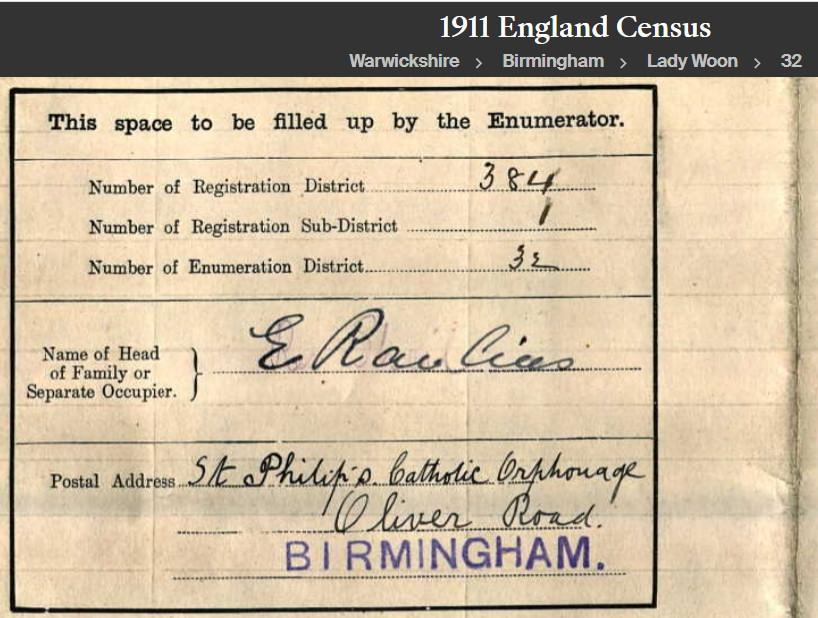
Elizabeth and Nathaniel Twigg appear to have had only one son, Arthur Twigg 1862-1943. Arthur was a photographer at 291 Bloomsbury Street, Birmingham. Arthur married Harriet Moseley from Burton on Trent, and they had two daughters, Elizabeth Ann 1897-1954, and Edith 1898-1983. I found a photograph of Edith on her wedding day, with her father Arthur in the picture. Arthur and Harriet also had a son Samuel Arthur, who lived for less than a month, born in 1904. Arthur had mistakenly put this son on the 1911 census stating “less than one month”, but the birth and death of Samuel Arthur Twigg were registered in the same quarter of 1904, and none were found registered for 1911.
Edith Twigg and Leslie A Hancock on their Wedding Day 1925. Arthur Twigg behind the bride. Maybe Elizabeth Ann Twigg seated on the right: (photo found on the ancestry website)
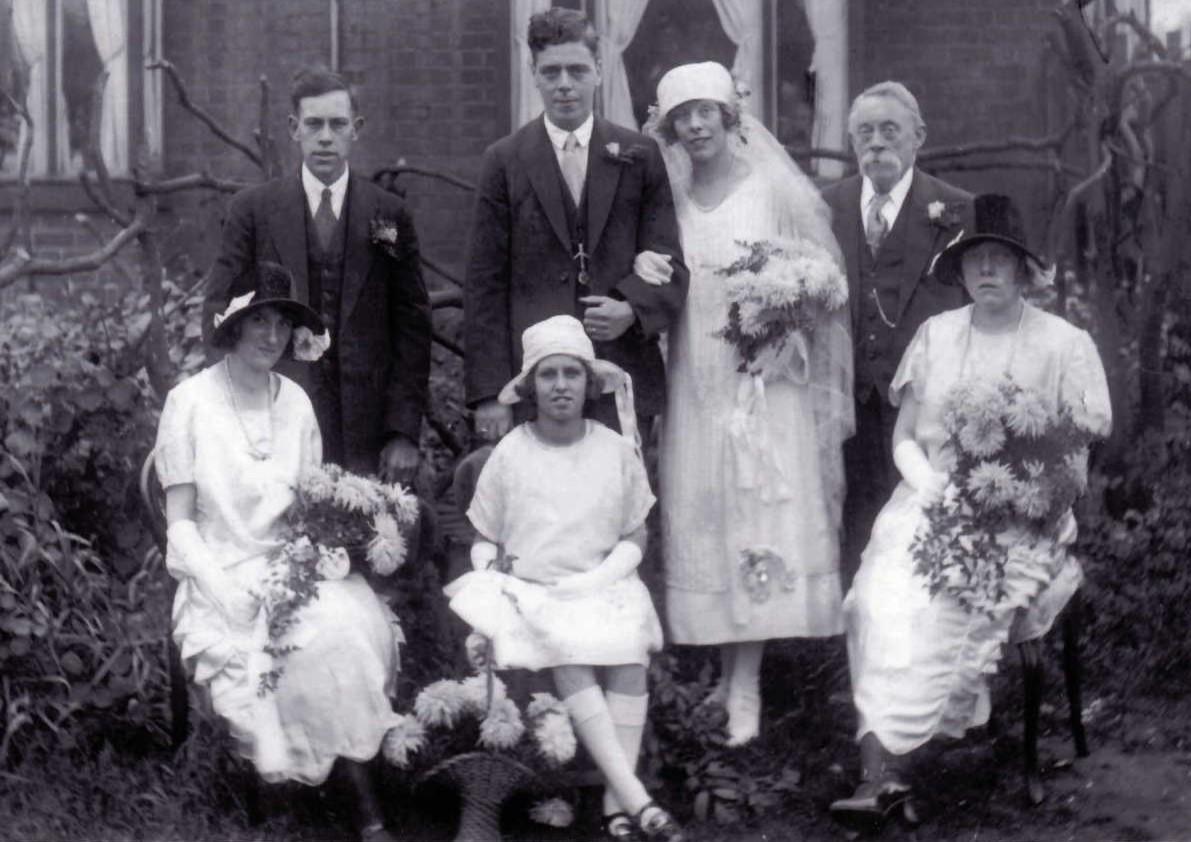
Photographs by Arthur Twigg, 291 Bloomsbury Street, Birmingham:
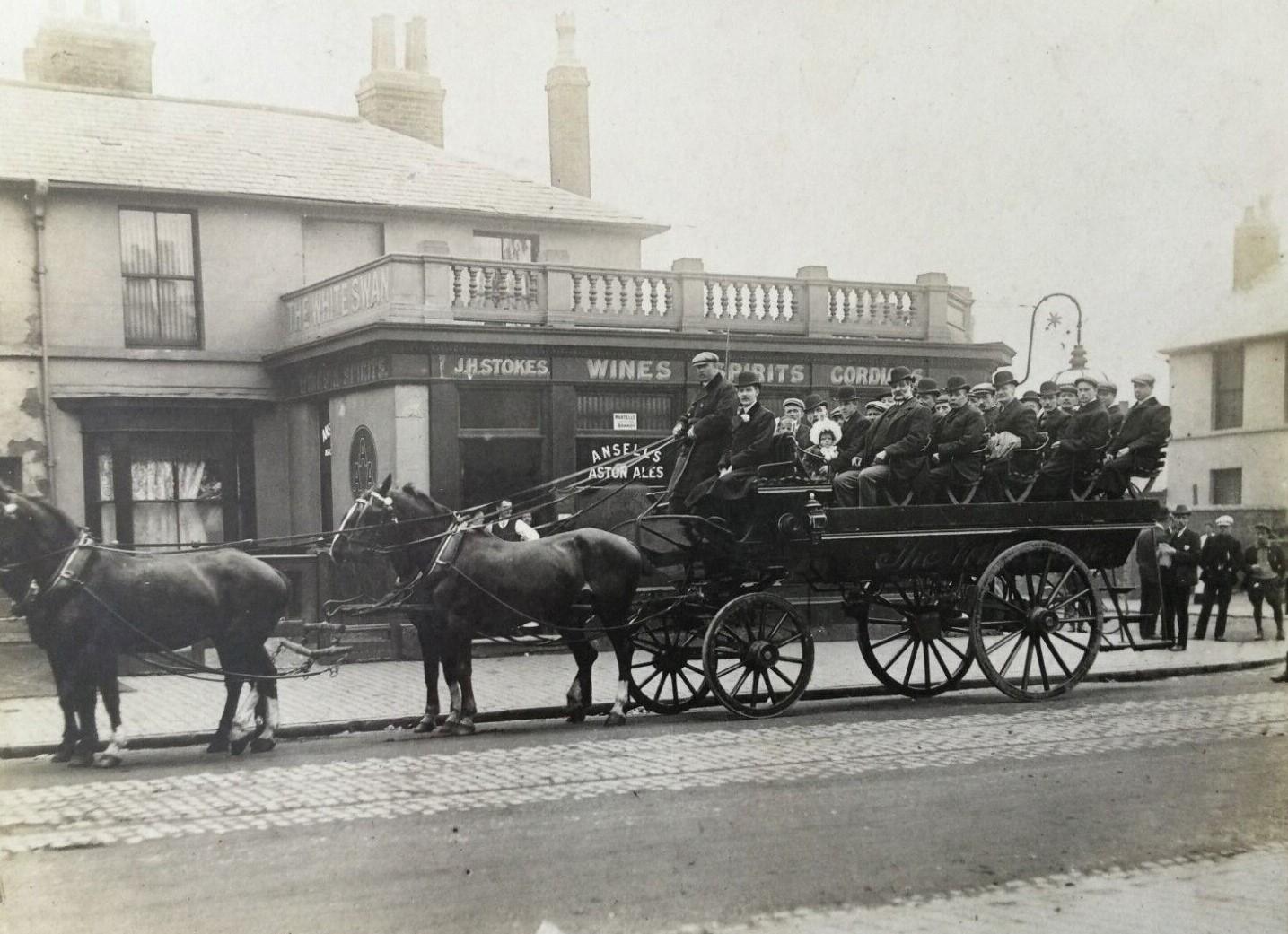
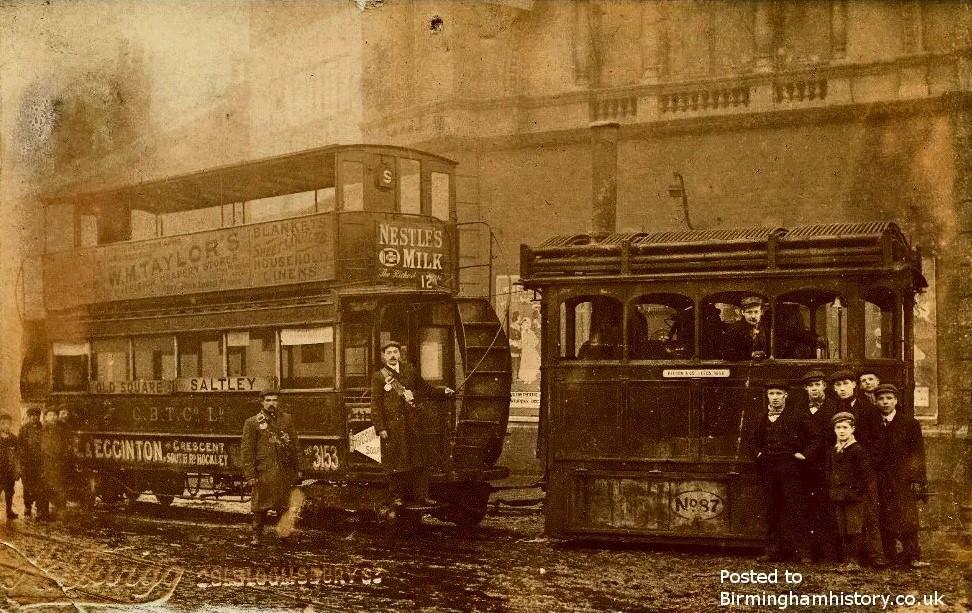 April 2, 2023 at 1:45 pm #7222
April 2, 2023 at 1:45 pm #7222In reply to: Prompts of Madjourneys
Very well, let us focus a bit on an overarching mystery.
So, Xavier is working on this program he calls AL (for Alternate Life), for a company we know little about.
Meanwhile, the game they’re playing on, Orbs of Madjourneys seems to direct them to certain quests which subtly influence their activities. For instance, after playing the game, a succession of events got the four of them booking a trip to the Flying fish Inn in the middle of Australian outback (Zara is living in Australia unlike the others).
Let’s assume the Game had somehow detected some unlawful or immoral activities being conducted, and has started to drop clues to influence these 4 gamers, selected because of their unique connexions and some of their special skills to get to reveal and bring the mystery to light.
Zara has an explorer mind, free-spirited, jumping right in. It’s suggested she was assigned group leadership for this round of game, while taking care of a group doesn’t come naturally for her. Yasmin is talented and it is said she is the brains of the team and also a competent actress, which may come in play at some point. Youssef is a journalist, and works for Miss Tartiflate, owner of THE Blog, a blog with a soul – unlike rival blog from Botty Banworth, the lady millionaire, who is sponsoring the Carts & Lager festival at the town of the Flying Fish Inn, next to the mines. Xavier has a bit of a monkey mind, but is also good at drawing connections; he’s a programmer for AL.
Which brings us to the group quest. The current hunch is that there is some shenanigan at play in the old collapsed mines of the town, where some key characters were lost in the past. One of them being Fred, a sci-fi writer who disappeared to Fiji to protect his family (the owners of the Flying Fish Inn) a decade or so ago. It’s suggested by the last poem found in the game that it may have something to do with illegal underground water drilling —possibly for frivolous usages of a select few elite, like maintaining a golf green nearby or other things.
If that is on the right track, we need to accelerate the path of discovery of these mysteries for our 4 characters. The game will suggest additional clues to their quests, so that they can use their skills during the Carts & Lager Festival to discover the truth, while remaining out of harm’s way.
Here are some additional clues that the game will suggest to our four characters:
Zara:
“To find the truth, you must first seek the light.” 🌞🔍🕯️💡🔦
“The answer lies beneath the surface.” 🕳️🔍👀🌊💧Yasmin:
“All the world’s a stage, and we are merely players.” 🌍🎭🤹♀️👥🕺
“Sometimes, the truth is hidden in plain sight.” 👀🔍🤫🧐🕵️♀️Youssef:
“Words have power, and the pen is mightier than the sword.” 📝🗡️💪📚👨💻
“The truth may be hidden in the most unexpected of places.” 🤔🕵️♂️🔍🧩🕰️Xavier:
“The truth is a puzzle waiting to be solved.” 🧩🔍🤔🕵️♂️💡
“Sometimes, the smallest details can lead to the biggest discoveries.” 🔍👀🔬🧐🔎What are potential outcomes for our 4 characters in game and in real life.
How are they going to work together to unravel the mystery and discover the truth.There are several potential outcomes for our 4 characters as they work together to unravel the truth about the collapsed mines and the illegal underground water drilling.
In the game, they may encounter various obstacles and puzzles to solve, such as deciphering codes and finding hidden passages. They will need to work together and use their unique skills to uncover the truth and prevent any further harm.
In real life, they may need to conduct research and gather information about the history of the town and its residents. They may also need to interview locals and investigate any suspicious activity related to the water drilling. They will need to be careful not to draw too much attention to themselves, as the perpetrators may try to silence them.
If they are successful in their quest, they may uncover a conspiracy involving powerful people in the town and beyond who are profiting from the illegal water drilling. They may also discover the fate of Fred, the missing writer, and other key characters. The truth may have a significant impact on the future of the town and its residents.
To work together effectively, each of the characters will need to utilize their unique skills and strengths. Zara’s exploratory nature may help them discover hidden clues and passages, while Yasmin’s intellect and acting abilities may allow her to gain access to key information and people. Youssef’s journalistic skills and connection to Miss Tartiflate may provide them with insider knowledge and resources, and Xavier’s ability to draw connections and work with technology may help them piece together the puzzle.
Overall, by working together and using their skills in both the game and real life, our 4 characters may uncover a significant truth and make a positive impact on the town and its residents.
March 7, 2023 at 11:01 am #6773In reply to: The Precious Life and Rambles of Liz Tattler
While Liz’ was playing possum at the mere mention of her mother, Godfrey was burying himself more deeply in the exploration of Liz’ old writing.
Remembering his role as her publisher did something to him. Somehow, even peanuts didn’t capture his interest as much nowadays, but the exploration of the stories themselves had put a literal spell on him.
He was for one, marveling at Liz’ capability to jump straight into writing, and especially her early works were quite difficult to understand because of that free-flowing ability, unencumbered by such worries as continuity or even characters consistency. While his own interest was more about providing a finished product, somehow the works of Elizabeth Tattler had defeated every attempts at that.
What I need is a map… He’d thought. To be able to contextualize a random quote from any of her opus, give it a sense of direction. If we assume the reader is carried into a journey, writing that same journey would require a map of sorts. But the writing are as much about revealing the map, some parts hidden by the relief or terrain, as they are about providing a direction…
That’s when he looked at his phone messages. 357 unread. Liz’ had been playing with images rerolls in this new app. He sighed looking at the last image. An unexplainable creature and a jelly bean cart in an odd landscape.
There was no map big enough to contain her genius creativity he reckoned. There was some relief in that too.
February 18, 2023 at 3:56 pm #6553In reply to: The Jorid’s Travels – 14 years on
Luckily for them, the sand structure with the nearby nests of snapping sand turtles was also a graveyard for the military drones that weren’t apparently programmed to register natural elements as threats.
They quickly found four of them who weren’t completely damaged, and with some technical assist from Jorid, Georges was able to repair the propulsion and deactivate the military programs and tracking beacons.
Klatu had some ropes in his speedster that they tied to their rudimentary drive and the drones, so they could carry Léonard’s body while he was still in stasis.
His vitals were generally positive, and Salomé kept checking on him, while Georges and Klatu managed attaching the odd assemblage of drones to their craft.
The ride back wasn’t as bad as the first time, maybe due to the extra cargo that made maneuvres more complex for their green driver.
“This is worth the detour. Seems like Klatu really wanted to save time and avoided to show us the scenic route the first time,” said Georges trying to break the tense worried silence.
Salomé smiled weakly “Léonard’s consciousness is embroiled into complex thoughts; they have to deal about some threat, the nature of which eludes me for now. It looks as though he’s absorbed some sort of forbidden knowledge, something potentially dangerous,” Salomé said to Georges. “I’m no longer as sure he was imprisoned for his punishment, but rather for protection…” she sighed. “for everyone else’s protection… I will feel better when we’re all back to the Jorid and we can run a full diagnosis.”
Georges looked at his friend apparently sleeping, and wrapped a loving arm around Salomé’s shoulder “It’s not going to be long now. He’s going to be fine.”

“Horrible doing business with you.” Klatu said as they parted, rubbing his hands together in gleeful satisfaction. Whatever the Jorid had organised as a deal for his payment, it seemed the added drones weren’t part of it and came as an extra bonus.

Inside the Jorid, while Salomé was setting up space for Léonard and making the preparation for the diagnosis, Georges looked at the tiles board, readying the craft for imminent departure.
A new tile had appeared, with a distinct pattern form, almost like an ogee.
“Jorid, is this new?”
“Indeed Georges, our adventure has inspired me to create new avenues of exploration.”
“Oh, that’s fresh.” Georges looked into the shifting symbol at its surface. After it stabilised, he could see there was a sort of spiral shell with forms reminiscent of the mocking turtles peeking out from the centre, surrounded by sand dunes.

“Jorid, tell me more please.”
“Sure, I’d call it ‘Sandshell‘. Do you want the full curriculum?”
“Absolutely, colour me intrigued!”
“The Sandshell:
Function: A reminder of the fragility of our perceived reality and the importance of questioning our assumptions
Families: Vold, Zuli, Ilda
Significance: The Sandshell represents the shifting and unstable nature of our beliefs, assumptions, and understandings. Like the sand that slips through our fingers, so too can our perception of the world around us be ephemeral and illusory. The image of the mock turtle serves as a reminder that we often live under assumed identities and in a world built on questionable foundations.
As advice: The Sandshell encourages one to question their beliefs and assumptions, to examine the foundations upon which they have built their reality, and to search for a deeper understanding of truth.
Depiction: The Sandshell can be depicted as a spiral shell with a mocking turtle peeking out from the center, surrounded by sand dunes. The sand symbolizes the instability of our perceptions and the turtle represents the assumed identities and neurotic fairy tales that make up our reality. The spiral form of the shell represents the journey of discovery and self-reflection.”“I love it,” said Georges enthusiastically “can we use it to plot our next course?”
“As a matter of fact we can Georges. Let me realign the grid and propose some suggestions. Do you have a seed thought to offer for this journey?”
Georges pondered for a while, when the image of the fishboard sprung forth in his mind. “Our little adventure is reminding me of our origins, Jorid —Léonard, working on the fishboard, your ancestor in a way… Us, finding Léonard… It feels like an adventure back to our origins. Can you project a destination on this vector…” then thinking at Salomé’s worried face “… that would be safe for our next stop, and allow us to find help for Léonard.”
“Verily.” Jorid answered back. “Course plotted. Please get comfortable until we arrive at our destination.”
-
AuthorSearch Results